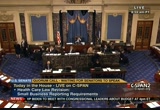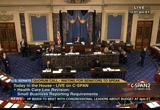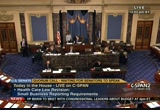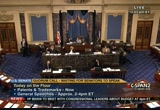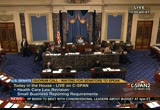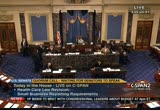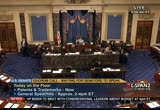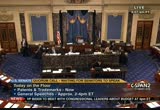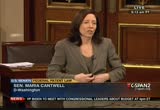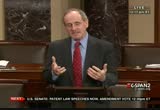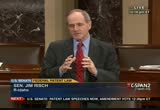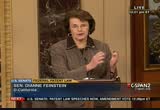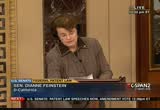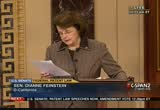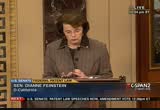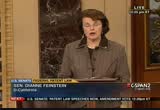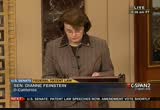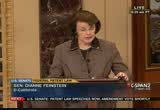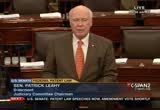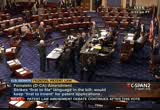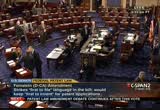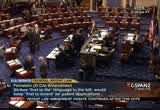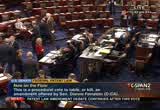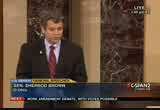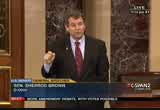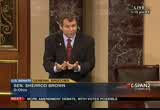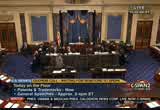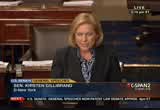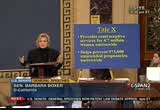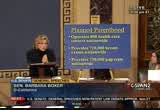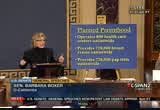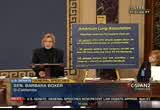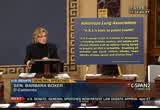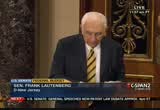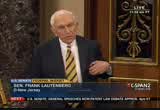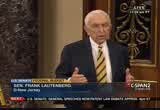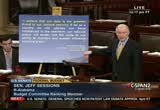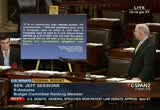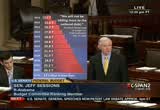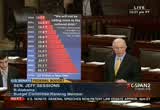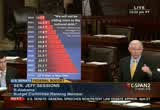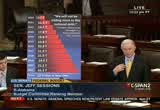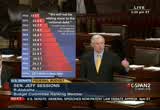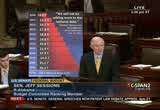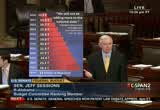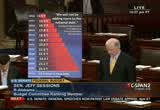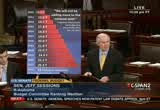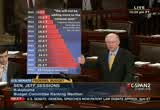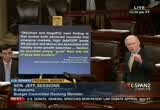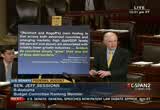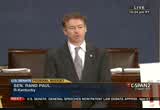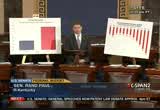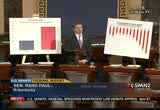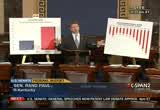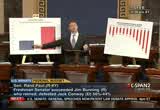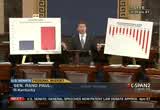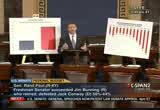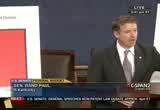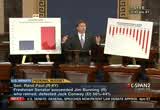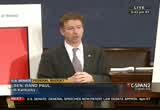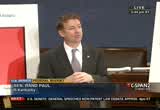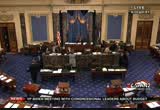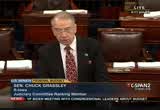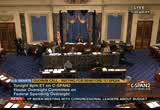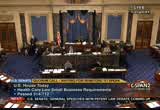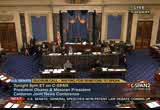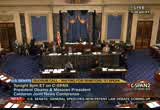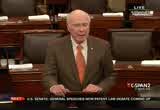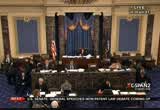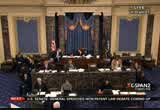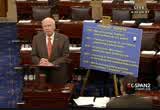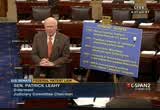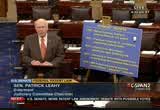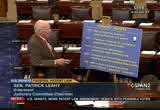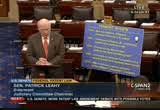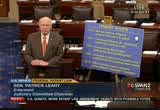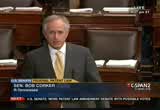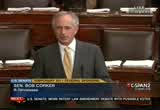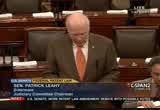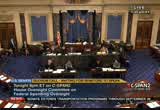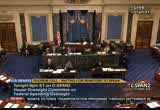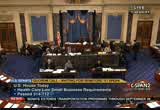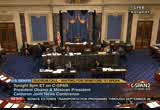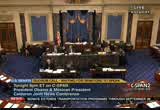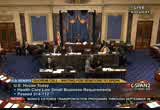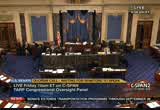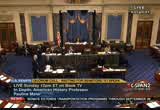tv U.S. Senate CSPAN March 3, 2011 12:00pm-4:59pm EST
12:09 pm
12:10 pm
the presiding officer: without objection. ms. cantwell: madam president, am i correct that there's a vote at 12:30? the presiding officer: that's correct. ms. cantwell: and time is equally divided and the feinstein amendment? the presiding officer: correct. ms. cantwell: madam president, i rise today to support the feinstein amendment and to ask my colleagues, who i know have been working diligently on this legislation for several years now, to respect the very tough balance that has been so opt-in this legislation as this legislation came out of the judiciary committee. i know we passed a managers' amendment yesterday. and i know that managers' amendment now is catching a lot of people off guard because there were far more changes than people realized in that managers' amendment that i think upsets that apple cart of balance that was struck in the judiciary committee. and so i'm urging my colleagues
12:11 pm
to support the feinstein amendment and expressing my concern for the underlying bill that is something that at this point in time i can't support. now, i don't come to that decision lightly nor the fact that i have many high-tech companies in the state of washington who might say we need patent reform and that this is good innovation. but large high-tech companies are not the only people that know something about innovation. in fact, most of the people who have helped build those organizations were once the small inventors themselves of key technology. and what's at stake here is unbalancing the apple cart as it exists today to innovation not -- not just innovation in general, but innovation in an information age. the meal ticket for all of us is going to be the invention and creation of new products and
12:12 pm
services. so that's the great time and age that we live in. but if in this legislation we all of a sudden upset that apple cart where we are tilting the playing field in support of large corporations who were already -- who already made their market and made their markets and made their success and slowed down on the rate of innovation in their companies and do a lot to acquire technology from smaller inventors, but now all of a sudden in this underlying bill, particularly in the area of damages, make sure that the big corporations can win and any kind of legal -- in any kind of legal dispute against the technology holder or reators -- creator because they're able to out last them in a legal battle because they're more well financed, more well heeled and because of that change in the underlying bill, leave the small
12:13 pm
guy without many resources. the only thing that the small inventor has is their intellectual property and a fair day in court. and if now we take that away from them, i guarantee you they will have less success and when you have less success of having a thousand flowers bloom, then we have a problem. this is not about what five or six or seven large corporations can create. this is about what thousands and thousands and thousands and thousands of innovators are going to create in the future. and whether they are going to be incented or disincented to do that. the feinstein amendment tries to protect the current process to protect what is the rights of those inventors today under current law. and i'm sure my colleagues will say, well, that's not the way the rest of the world does it.
12:14 pm
well, i would say to my colleagues, i'm not sure the way the rest of the world does it is the mark that we're trying to hit. what we're trying to preserve is the entrepreneur spirit that has been created in the united states and i'm not saying that this isn't based on just raw creativity of individuals, it is, but it's also based on financial incentive and incentive that those individuals have their their intellectual property can be protected. but if this is going to be a became go the -- about the big boys coming to washington and squashing the small inventors, count me out. this has to be a level playing field. and i get it's tempting to want to in the last minute stick into the managers' amendment language couldn't get out of committee. but if we want to get this legislation through this process, then we have to take into consideration the rights of the inventors along with the rights of those larger companies that are trying to acquire or
12:15 pm
integrate or be part of the manufacturing on a larger scale of that inventor's technology. so i would say to my colleagues that the feinstein amendment in keeping the rights of the inventors where they are gives them at least a chance to hold on to that. i think that the under lying bill has changed to much in the managers' amendment that we're going down a road that will make it difficult forus to get a piece of legislation. we have to respect the rights of the small individuals here. and we can't have carveouts for specific jurisdictions like wall street who think they can have their cake and eat it, too. this has to be about how we move forward on a smoother patent process, but how we take into consideration that we have gotten to this great place in our country because we have had
12:16 pm
a balance and an empowerment of these technologies, and not all of a sudden in one fell swoop take that away on the senate floor and basically undermine what is the creative opportunity for the u.s. economy. it is in invention, and we want thousands and thousands and thousands of inventors, not just inventors that work for big corporations, thousands of inventors who have their rights. so i support the feinstein amendment, and i thank the president, and i yield the floor. mrs. feinstein: madam president? the presiding officer: the senator from california. mrs. feinstein: thank you, madam president. i want to thank the senator from washington for her comments. we welcome her support, and i was pleased to be able to listen to these comments. what is the current status of the time allocation? the presiding officer: the proponents have 3 1/2 minutes remaining, and the opponents have ten minutes remaining.
12:17 pm
mrs. feinstein: i would ask unanimous consent that our 3 1/2 minutes be extended so that senator risch who will speak next has the time that he requires and i have the time for a brief close. the presiding officer: without objection. mrs. feinstein: thank you very much. mr. risch: thank you, madam president, fellow senators. i'm proud to come to the floor here to speak on the amendment to which i am a cosponsor. look, this -- this is simply a matter of fairness, and with all due respect to my colleague from washington about the big boys versus the small inventors and what have you, i don't view it as that at all. i really view it as a fairness issue, and that is the person who in -- who created the invention gets the benefits of that creation, not the person with the fastest tennis shoes, and that's what you're doing here is you're creating what's called a statute which is
12:18 pm
similar to what is place in many states on real estate filings. it has a legitimate place in the real estate market but not here. with so much on the klein, with creativity on the line, it should be the person that actually does the invention who reaps the benefits of that invention, and that's all this does. the other thing that i think is so important here is it preserves the situation that we have had for many, many years in place. i've heard people say oh, this is a poison pill. if you take this out, it kills the bill. that isn't the case at all. it simply preserves the situation that we have in place today. it's the right thing to do. it's the fair thing to do, and i would urge an affirmative vote for this, and i yield the floor to my colleague from california, senator feinstein. the presiding officer: the senator from california. mrs. feinstein: thank you very much, madam president. i want to thank senator risch for his cosponsorship of this, and of course i agree exactly
12:19 pm
with his statement. at this time, i'd like to briefly summarize the arguments in favor of our amendment, to strike the first to file provisions from this bill. this amendment is cosponsored, as i said, by senator risch, majority leader reid, senators crapo, boxer, ensign, and i would ask unanimous consent to add senator begich. the presiding officer: without objection. mrs. feinstein: thank you, madam president. proponents of the first to file argue that the rest of the world follows this system, and making this change will harmonize our system with theirs, and that's true, but under our first to invent system, our nation has been by far the leader in the field of innovation, the leader in the field of new patents, new discoveries, new inventions, and the other first to file countries have been playing catchup with our technological
12:20 pm
advances. i wouldn't trade our record of innovation for any of theirs, and i doubt many members of this body disagree with me if they really think about it. think about the history of innovation. what sets america apart is so many of our great inventions start out in small garages and labs with driven, inspired people who have great ideas, developed them and then they take off. i mention companies that have started this way yesterday. hewlett packard, apple, google, and there are hundreds and perhaps thousands of others. they started from humble beginnings, and they grew spectacularly, creating jobs for millions of americans and lifting up our economy and standard of living. i know an inventor who invented sky vodka, and the vodka he drank disturbed his stomach, so
12:21 pm
he figured out biologically and chemically what it was, and he invented a vodka called sky vodka. small inventor. that company was subsequently sold, i think for a great deal of money, but it started with one man who had a stomachache from drinking vodka. now, this may be just one type of example, but apple is certainly another type of example. a garage many years ago in california, and out of that emerged this giant company. so these companies start from humble beginnings. they grow, they create jobs for millions of americans, they lift up our economy and our standard of living. the national small business association is a supporter of this amendment, and other small business inventor groups have joined them in saying just last week that first to file, and i
12:22 pm
quote -- "disrupts the unique american start-up ecosystem that has led to america's standing as the global innovation leader." end quote. first to invent has served our country well. here are the main problems as i see it with the bill's first to file system. first, the grace period. it guts the current grace period. in the words of a letter from 108 start-ups and small businesses that protect inventors' rights to their invention for one year, for offering them for sale or making a public use of it, among other things, before they have to file a patent application with the patent office, so there is this year's grace period for them to get their act together. now under the present system, instead of preparing a costly patent filing, they could
12:23 pm
concentrate on developing their invention and obtaining necessary funding. the majority leader just circulated a statement to members which really speaks to this grace period. i'd like to quote one part of that statement. "the grace period comports with the reality of small entity financing through friends, family, possible patent licenseees and venture capitalists. the grace period allows small inventors to have conversations about their invention "-- important --" and to line up funding before going to the considerable expense of filing a patent application or having to race to the patent office because they're afraid somebody else might have heard the conversation, might have stolen it from them and moved on. in fact, senator reid goes on,
12:24 pm
"in many ways, the one-year grace period helps improve patent quality. inventors find out which ideas can attract capital and focus their efforts on those ideas, dropping along the way other ideas and inventions that don't attract similar interests and may not, therefore, be commercially viable." so this first to file essentially replaces this critical innovation-protecting provision with a more limited and murky grace period that only runs from the undefined term of disclosure. there is no discovery. litigation is sure to ensue as courts interpret this term, creating uncertainty that i believe will chill investment in start-ups which, in turn, will dampen innovation and job growth.
12:25 pm
unfortunately, first to file incentivizes inventors to race to the patent office, to protect as many of their ideas as soon as possible so that they are not beaten to the punch by a rival. thus, first to file will likely result in significant overfiling of dead-end inventions, unnecessarily burdening both the patent office and especially small inventors. third reason, difficulty of proving copying. the third major problem with this bill's system is the difficulty of proving that someone copied your innovation -- your invention, excuse me. currently, you, as a first inventor, can prove that you were first by presenting evidence that's in your control. this is under first to invent. your own records contemporaneously documenting the development of your invention. but under this bill, to prove
12:26 pm
that someone else's patent application came from you, was derived from you, you would have to submit documents showing this copying, and because there is no discovery, you wouldn't have those documents in your possession. so it makes proving your invention much more difficult. the bill doesn't provide for any discovery in these derivation proceedings. therefore, the first inventor can't prove his or her claim because he or she does not have access to the documents of the alleged copier. a senator: madam president? mr. leahy: how much time remains for the senator from vermont? mrs. feinstein: i will just take two minutes more. the presiding officer: the senator from california by consent is using the opponents' time. mr. leahy: is using my time? mrs. feinstein: no, i'm not.
12:27 pm
i have asked to extend our time. mr. leahy: madam president, if we're supposed to vote at 12:30, and i realize the senator couldn't be here when her amendment was brought up and couldn't be here when her amendment was modified. we did that for her, but i would -- in opposition to it, i should at least have some of my time to be able to use. mrs. feinstein: i would be very happy -- i was here yesterday, i did speak on the floor, mr. chairman. i did in a rather lengthy speech indicate the arguments that i felt. i have asked just for a short period of time. my remarks are no more than five pages, which should take me a minute and a half more to conclude, and i hope i would be offered that. mr. leahy: madam president, at the hour of 12:30 when we're supposed to vote, i would ask consent, so far as my time has been used by those in another position, that senator grassley and i have four minutes back of
12:28 pm
our time. the presiding officer: without objection. the senator has consent. mrs. feinstein: fine. then i would ask that my time on this side be extended for another minute and a half. the presiding officer: the senator has that consent. mrs. feinstein: oh, thank you very much. so i have outlined the difficulty of proving copying under the first to file system. disputes about who was the first to invent are resolved by the patent office in what's called an interference proceeding, which number about 50 a year only out of 480,000 patent applications. now, the opposition infers that this is a huge problem. 50 a year out of 480,000 patent applications is a very small percentage. as i said in the beginning, madam president, america leads the world under the first to
12:29 pm
invent system. i don't think we should fix what isn't broken. this works for people who have great ideas but don't have money, who begin in a garage, in a lab. it has worked well for our system. i ask that you join senator risch, majority leader reid, senators crapo, boxer, ensign, begich and myself in voting yes on this amendment. i yield the floor, madam president. thank you very much. mr. leahy: mr. president, as i said earlier -- the presiding officer: the senator from vermont. mr. leahy: madam president, as i said earlier, secretary locke on fronted the erroneous notion that the current outdated system is better for small independent inventors. he said the costs of proving that one was first to invent is prohibitive, requires detailed and complex documentation of the invention process.
12:30 pm
in cases where there is a dispute about who the actual inventor is, it typically costs at least $400,000 in legal v.c.r., even more if the case appeals. by comparison, a filing date through a provisional application establishing priority of invention costs just $110. madam president, people -- this amendment, and i appreciate the work of the distinguished senator from california, but her amendment is a killer amendment. it would kill this bill. the -- our bill is setup so that it will be -- allow us to compete with the rest of the world. right now in our patent system we are behind the rest of the world all the different countries that we have to compete with. our bill as written allows us to compete with the rest of the world. her amendment would hold us behind -- back and give an advantage to those countries
12:31 pm
that we have to compete with. i yield the floor. the presiding officer: the senator from iowa. mr. grassley: i associate myself with the remarks that the distinguished chairman of the committee just made and ask people on my side of the aisle to not support the feinstein amendment. i move at this point to table the feinstein amendment and ask for the yeas and nays. the presiding officer: is there a sufficient second? there appears to be. the question is on the -- to table the motion -- to table the feinstein amendment as modified. the yeas and nays have been ordered. the clerk will call the roll. vote:
12:57 pm
the presiding officer: are there any senators wishing to vote or to change their vote? the motion to table the feinstein amendment number 133, as modified, has been agreed to. the ayes are 87, the nays are 13. mr. leahy: move reconsider. the presiding officer: so moved. without objection. mr. leahy: table, yeah. the presiding officer: the
12:58 pm
senator from michigan. ms. stabenow: thank you, madam president. i would ask unanimous consent -- the presiding officer: may we have order. ms. stabenow: thank you, madam president. first i, do have an amendment. i understand that it has been agreed to. so i would ask unanimous consent that the pending amendments be set aside and i would call up amendment number 126. is there objection? without objection. the clerk will report. the clerk: the senator from michigan, miss stabenow, proposes an amendment numbered 126. on page 104, strike line 23, i -- strike line 23. mr. leahy: i ask that reading be dispensed with. the presiding officer: without objection. ms. stabenow: thank you. mr. leahy: i ask it be adopted. the p the presiding officer: if there is no further debate on the
12:59 pm
amendment, all those in favor say aye. all those opposed say no. the ayes appear to have it. the ayes do have it. the amendment is agreed to. mr. leahy: i move to reconsider. a senator: lay it on the table. mr. leahy: and i yield to the senator from michigan. the presiding officer: the senator from michigan. ms. stabenow: thank you very much, madam president. i want to thank the distinguished chairman of the judiciary committee and our ranking member and those who are working very hard on a very, very important jobs bill here today, and on behalf of the people of detroit and people of michigan and senator levin and myself, i want to thank very much the members for supporting this amendment. just a few months ago, we learned that detroit, michigan, will be the home to the first-ever satellite office of the u.s. patent and trademark office. this office is really great news for us because in michigan we have a proud tradition of innovation and invention, and we are looking forward to
1:00 pm
continuing that tradition while reducing the backlog of patent applications so that new products can get into the market faster. this amendment we just adopted would name the new facility after a great michigan inventor, elijah mccoy. his life captures the spirit of michigan ingenuity and entrepreneurship. ities parents escaped slavery and fled across the border to canada. while training as an apprentice in scotland, he came to ypsilanti, michigan, and set up home and had a home base of inventing things, an invention shop. over the course of his brilliant life, elijah mccoy secured more than 50 patents, but he is best known for his inventions that revolutionize how our heavy-duty machinery, including locomotives, function today. and he has -- i will not go through all of my statement at this time, madam president. i will put it in the record, but i would note in interest that
1:01 pm
with as many -- with his many inventions, he was incredibly effective. in fact, many tried to copy his ideas, but no one could match mccoy's ideas, and in fact machinists started asking if their engines were using the real mccoy, and so that's where we came to the -- the phrase "the real mccoy." we're very proud of that because of mccoy technologies. he didn't have an easy journey. as an african-american in those times with the industrial revolution going on, but he never gave up, continued inventing, and the city of detroit today proudly celebrates elijah mccoy day and has dedicated his home as a historic site, and we're very proud of that as well. so it's a great honor for us to have this first-ever patent trademark satellite office and to have it named after a great leader and a great inspiration in detroit, and i thank very
1:02 pm
1:08 pm
the presiding officer: the senator from ohio. mr. brown: thank you, mr. president. i ask unanimous consent to dispense with the quorum call. the presiding officer: without objection. mr. brown: thank you, mr. president. i have -- we have all watched the news. madison, wisconsin, columbus, ohio, trenton, new jersey, other places around the country where workers, public employees who when you really analyze it are paid with, including benefits, not much more or less, depending on the place, than comparable private sector workers, whether they are high school graduates or college graduates or whatever. the pay is pretty similar, the benefits -- overall pay and benefits are pretty similar.
1:09 pm
we have seen around the country that these public employees are, in most cases, willing to share in the sacrifice of balancing budgets and share in the sacrifice of fighting back against this bad economy. in fact, we know that workers, teachers, police officers, nurses, people working at the unemployment bureau, people working at the department of the interior, whatever, that they have taken pretty big hits already in terms of lost jobs, in terms of no raises, in terms of paying more for their health benefits. so we know, even though these are not the people that caused the recession any more than the workers at lordstown, ohio, or assembling cars or defiance, ohio, building engines or northwood, ohio, making bumpers for the chevy cruz, even though they weren't responsible for the failure of the auto industry, there just seem to be as we have seen from these ideological conservative governors, there seem to be an assault all over
1:10 pm
the country on workers blaming workers, whether they are public or private workers, blaming workers for the problems in this economy. they continue to want to give tax cuts to the richest people of wall street as they take their bonuses and make big dollars and see their incomes go like this, but as workers, they have pretty much had no real increase in the last ten years, wages in this country have mostly been stagnant, how can you blame the workers for this. that's why what we have seen around the country has been so interesting. 8,500 people two days ago in columbus, ohio, demonstrating not against budget cuts because they know those are coming, but demonstrating against this direct assault by the government, by the governor and the legislature, legislative leaders, on the right to organize and bargain collectively, a right that has been part of americana that have been part of our values for 75 years. why do they think we have a middle class? we have a middle class because workers could band together and say to a company that's very
1:11 pm
profitable, some of that profit you're making, we should get some of it because we're your workers and we have made your company more prosperous. management is important, crucial. workers are important, are crucial, and worker wages go up, management wages typically go up, but we have seen workers' wages just stagnant now, in part because of a lack of unionization or decline of unionization. now, we're also seeing in madison, in columbus, in trenton, in harrisburg, in indianapolis, in lansing, in these capital cities, especially in my part of the country, mr. president, we have seen a real play on fear. they're trying to turn private sector works against public sector workers. they blame the u.a.w., the auto workers for the problems with the auto industry. now they are blaming the public workers for the problems with the state budgets in trying to get the auto workers, the private sector workers and the union workers up against each other and fighting each other. that kind of -- that is the -- that is the most base karl rove-type politics that turn
1:12 pm
working class people one against another. it's -- it's wrong, it's morally wrong, it's politically wrong, and it's very wrong for our country. now, what's also been interesting about these protests, they are not all steelworkers and electricians and american federation of government employees and scmu. there are a lot of people of faith that have been involved in this. i did a roundtable at an episcopal church right off statehouse square and some of the leaders of the church and volunteers of the church were there, and they know that part of my belief -- and i don't preach or wear on my sleeve my christianity, but they understand the bible talks a lot about poverty and a lot about fairness and equality and egalitarianism, if you will. and for them to go against workers on behalf of the richest people in our country -- and that's really what they're doing in the governor's office in columbus, in madison, in trenton and other places -- runs counter at least to my faith.
1:13 pm
i'm not going to judge their faith. they worship what god they worship and they read what scripture they read. but when you look at what -- what my faith means in whether -- i'm a lutheran, i'm not a catholic. but you look at leo xiii and what he said about what catholicism means for workers in fairness, you know, it's -- it's -- it's point match -- whatever, point, set, match. that clearly spoke very definitively about this. mr. president, i have said this before on the floor today, but i wear this win on my lapel. it's a depiction of a canary in a bird cage. 100 years ago, miners took a canary down in the mine. if the miner died of toxic gas, he got out of the gas. he only depended on himself. he didn't have a government that cared much to write safety laws, particularly child labor laws in the mines. he didn't have a union that was strong enough in those days to fight back. too many people that are ultraconservatives -- and there are many in both these bodies in the senate and the house -- want
1:14 pm
to go back to those days. they want to eliminate worker safety laws. they want to eliminate minimum wage. they are clearly going after collective bargaining. they are clearly going after so many of the things that we hold dear. again, mr. president, it wasn't the u.a.w. workers, it wasn't the service employee union worker at the state capital that caused this financial crisis. they have been the victims of it just like a whole bunch of nonunion workers have, but this financial crisis was caused by greed, by people overreaching, by the richest in our society grabbing and grabbing and grabbing for more wealth. and then they are going to turn this -- let's change the subject. turn this against those workers. that's just happened far too many times in our country. you know, mr. president, yesterday -- i'm a new member of the senate appropriations committee and i'm lucky enough to serve on senator leahy's subcommittee on foreign operations, and we brought the secretary of state in, secretary clinton, to talk to us about the state department budget. and one of the things she said -- and i mentioned madison
1:15 pm
and columbus after she said it, but one of the things she said was, you know, it's been unions in egypt, it's been workers in egypt and tunisia and around the world, it's been workers who so often, sometimes through their unions if they are allowed to have unions, sometimes through a more informer, non-- sort of an informer collection of people in what might look like a union but not formerrized who have taken on -- who have fought for freedom, who have fought for equality. a lot lot of these problems is because people are hungry. they want fairness and a chance to make a living. one of the things that secretary clinton talked about, yes, this is not enforcing labor law in guatemala. it will enforce labor laws in our trade agreements, the labor component of our trade agreements around the world. because we stand for a more egalitarian workforce. we believe workers should organize and bargain
1:16 pm
collectively. we believe in workers' compensation. we believe in workers safety. we believe in human rights and all of that is about the labor movement and you can support labor rights in guatemala, but you better be sure you're supporting labor rights in cleveland and troit an detroit , delaware. those were some of the words that secretary clinton said. i'm expanding on some of them. i look back in history, in some of the worst governments that we had, you know the first thing they did, go after unions, hitler didn't want unions, mubarak didn't want unions, these autocrats don't want independent unions. so when i see in the old soviet soviet russia and when i see -- history tells me about germany, i'm not comparing what's happened to the workers in madison or in columbus to hit expler stalin but i am saying that history teaches us that
1:17 pm
unions are a very positive force in society that creates a middle explas that protects our freedom -- class and that protects our freedom. so don't tell me you support unions internationally but you don't support unions here. don't tell me you support collective bargaining in poland but you oppose collective bargaining in zanesville or dayton, ohio, because, frankly, that's inconsistent and ultimately it's -- it's -- it's not taking the side of people whom we are supposed to represent. we know, mr. president, we know that -- i'm proud my state about three blocks, two blocks from the capitol in 1876, the capitol in columbus, the american federation of labor was formed. the first -- the actual of what i know now what began in columbus, ohio, in 1876 when some workers got together thinking there is some strength and some safety in numbers and we're going to have a better standard of living in a better county and more freedom for all if we begin to coalesce in a group of people.
1:18 pm
not to -- not to cause a -- bust a hole in the state budget, not to hurt companies but to make sure that -- that workers are represented and get a fair shake in the society. mr. president, it's all pretty simple. we have a strong middle class in this country because we have the right to organize and bargain collectively. we have a strong middle class in this country because we're a democracy, because workers can share in some of the wealth they create for their employers. and so i hope ten years from now, mr. president -- and i know that in delaware this is something you fought for with manufacturing and middle class and all -- that we will see, as productivity goes up and profits go up, that workers' wages will go up too. it's the american way. it's what we stand for. nothing in our society, frankly, is more important than a prosperous middle explas what it brings -- class and what it brings to us in terms of freedom and equality. mr. president, i yield the floor. note the absence of a quorum. the presiding officer: the clerk will call the roll. quorum call:
1:48 pm
a senator: mr. president? the presiding officer: the senator from missouri. a senator: mr. president, i ask the quorum call be set aside. the presiding officer: without objection. mrs. mccaskill: i ask unanimous consent that the following remarks be included in the record at the appropriate place. the presiding officer: without objection. mrs. mccaskill: mr. president, i rise today to pay tribute to a patriot, a businessman, a loyal
1:49 pm
father and an american hero. leonard truman ferrell, buck to his many family and friends, was laid to rest in arlington cemetery this morning. i know that his legacy lives on in the community that he helped build, the family that he nurtured, and the soldiers with whom he served. today i would like to take a few minutes to honor buck's life and contributions he made to his community. born and raised in southeast missouri, buck was imbued from an early age with those unique american values so prevalent among the members of the greatest generation: integrity, service to others, determination, and an undying sense of patriotism. since buck's family didn't have much money growing up, he learned at a young age to live within his means and to place little value on worldly possessions. my father didn't have a lot of
1:50 pm
worldly goods, buck once said, but he was a rich man in character. i know i speak for many when i say that buck, first and foremost, was also a man rich in character. buck was also a patriot of the highest order. having served in the united states army during the korean war, he fought for two years on the korean sense la and earned, among other decorations, the combat infantry badge, the presidential unit citation, two silver stars and two purple hearts. wounded multiple times, buck never faltered and steadfastly manned his post, whether in a frontline foxhole or as a heavy weapons trainer for new recruits. in light of his outstanding service, buck was even offered a battlefield commission. although he chose not to accept the commission, buck returned home and remained an active member in a number of veterans' organizations, like the american legion and the veterans of
1:51 pm
foreign wars for the rest of his life. never forgetting the country that he fought to protect, he raised every morning an american flag in his front yard. as you can guess, buck's dedication to others and stalwart work ethic continued long after his military service ended. for 25 years, he worked at the mccray equipment store in cruthersville, missouri, and retired as the general manager. as a member and former deacon at the first baptist church, buck helped sustain a thriving congregation, he also took on leadership roles in kiwanis. he earned an award from the historical society and recognition by the missouri state legislature for his enduring impact in southeast missouri. but even with all these commitments, buck always had time for family. he and his wife, patsy mallen
1:52 pm
ferrell raised four wonderful children, were the beloved grandparents to four grandchildren and one great granddaughter. can i personally attest to the great job they did with their children. their talented daughter christie is currently an invaluable member of my staff and is seated along with members of the ferrell family in the gallery today. my prayers are with all of them at this time of loss. mr. president, i ask today that my fellow senators join me in recognizing buck ferrell, not only because he was a great missourian, but because he embodied the true american values that have cemented american society for generations. buck worked hard, served god, fought for his country and loved his family. in short, he lived a life worth living. thank you, mr. president, and i
1:53 pm
2:00 pm
i ask unanimous consent that the quorum call be dispensed with. the presiding officer: without objection. under the previous order, the senate will be in a period of morning business with senators permitted to speak therein for up to ten minutes each, with the majority controlling the first hour and the republicans controlling the next hour. a senator: mr. president, i'm here representing 150 million women in the united states of america. and they are bewitched, bothered and bewildered by what the united states congress, particularly the house of representatives, in h.r. 1 has done to women. ms. mikulski: now, women all over america have to balance the family budgets so they know that our united states of america needs to get its fiscal act together. they also know that we need to live in a more frugal time. so they understand that.
2:01 pm
but what they don't understand is that in h.r. 1, with what the house did, that the entire burden has come from a very limited amount in discretionary spending. when you take off defense, homeland security, a lot of guys and gear kind of stuff, women and children are actually thrown under the bus. well, they're mad at hell and they don't want to take it anymore. so the democratic women today, in the hour that we've been given, are going to lay out the consequences of what h.r. 1 means. now, we in the senate and we, your appropriators, of which there are many women on it -- landrieu, feinstein, mikulski, murray -- we know that we had to bring about fiscal discipline. we've already in the senate appropriations -- one of the
2:02 pm
great men of this senate, senator inouye, we've already worked to reduce the appropriations in the senate to -- by $41 billion. now, mr. president, that's not beanbag. that is really meat and potatoes. so we feel we've already given it the option. but, my god, enough is enough. let me give you just top 10 reasons why h.r. 1 from the house is bad for women and children examine why we're ready to negotiate so that we don't have a shutdown of the government and we can have a final settlement on the budget for 2011. let just go through them. one, we defund the entire health care reform law. and i'm going to outline why that is bad for saving lives and why it's bad for saving money.
2:03 pm
it also eliminates title 10 family planning money. it jeopardizes breast cancer cervical screening for more than 5 million low-income women. they even went after head start. well, my god, even little kids in head start have to take it on the chin. it's going to cause 218,000 children to be kicked off of it. but we go farther. for the group that says it's pro-family, family values, we've got to defend life, they slash the nutrition programs for pregnant women by $747 million, affecting 10 million low-income pregnant women, new mothers and children. oh, my. we also cut funding for prenatal care and we went after afterschool programs. we also looked at what it means
2:04 pm
in terms of the future. we've cut funding for pell grants. we terminated funding that helps school comply with title 9, funding for job training that hurts over 8 million workers, many of them getting new training for the new jobs for the new economy. and something very near and dear i know to the presiding officer, they went after -- not after social security in terms of a benefit but went after the people who work at social security, the social security offices in which they work on everything from the direct social security benefit to the disability benefit. if h.r. 1 passes, over 2,500 people at social security will be laid off. that's -- in my home state, they were out in the streets in front of social security headquarters saying, what about us? we come everyday, we give you
2:05 pm
the actuarial information on how to keep it solvent, we make sure the checks are out there on time and in snowstorms we're showing up to make sure everything works, but at the end of the day, we're going to be told we're nonessential. hey, this whole "nonessential" drives me crazy, because ironically, what counts as essential is us. well, if we're going to be essential, we need to get real about how we come to an agreement on this c.r. so, mr. president, we in the senate feel we've given $41 billion already and we think h.r. 1 just goes too far. and it goes too far by leaving so many things 069 table -- so many things off the table that we can't get to the table. now, i want to talk about health care reform. we had many goals during health care reform, one of which was to reform -- to expand universal
2:06 pm
access. again, the presiding officer has been a champion of that, a stalwart defender of the public option and a stalwart defender of the single-payer system. and as we worked on it and we came up with a compromise, what was very clear was that there were certain things that we just had to do. one was whether we reform the public option or not, whether you're for a single-payer system or the system we have now, we knew we had to end the punitive practices of insurance compani companies. we know that in the health care reform bill, we also had to improve quality measures that would actually save lives and save money because of the consequences of it. and we also knew that if when he a strong preventive care benefit, that we once again, through early detection and screening, could minimize the
2:07 pm
costs to the insurance companies in the federal budget and also the terrible cost to families who face all kinds of problems, but particularly the dreaded "c" word, cancer. so that's why we passed the health care reform. now, over in the house, they thought it was going to be really cool to say we couldn't repeal health care. remember, they said repeal and replace. they've only talked about repeal. because they don't know how to replace. so they decided through h.r. 1 to defend it -- defund it, to take the money away, defund it. so let me just outline what we think very quickly about what it means to women and children. fist of all, what we did in the health care reform bill is we ended gender discrimination by the insurance companies.
2:08 pm
right now, or right before the passage of the bill, women were charged 40% more in many instances for health care premiums related to men of comparable age and health care status. 40% more. there was a gender tax of 40% put on by the insurance companies and their premium gouging that went after us. we ended that. the second thing was, the insurance companies were treating simply being a woman as a preexisting condition. so we went to the floor, and with the great guys in the senate -- you and others here -- we passed the preventive health care amendment. we wouldn't let them take our mammogram as way from us. we made sure also that our children could have early detection and screening in schools and the insurance company. and also along the way, because for us it's not only about gender, it's about an agenda, we included men in these preventive
2:09 pm
health services as well. now, if you defund -- if we agree to that element in h.r. 1, we will take away the preventive health care benefits. they guarantee coverage of preventive care and screening like mammograms for women under 50. we cannot go back. it would also repeal the quality measures like the famous pronovose checklist developed in maryland by a hopkins doctor. when used at just michigan hospitals alone, the simple low-tech way to lower in-house infections in hospitals, it saved michigan hospitals 2,000 lives and saved the state $200 million. we can do this, mr. president. there are so many things that were important in the health care reform bill. we cannot defend it. and as we move ahead in what we hope will be a settlement and a negotiation, we, the women of the united states senate, we, the democratic women, though we
2:10 pm
will move towards a negotiated settlement, will not surrender the women and children of this country. we will not let them be thrown under the bus and run over by h.r. 1. mr. president, i now call for one of our really able advocates, someone who's been a stalwart defender of child care in our county, senator -- in our country, senator patty murray. mrs. murray: mr. president? the presiding officer: the senator from washington. mrs. murray: thank you, mr. president. i want to thank the senator from mare hair for being our fearless leader and making sure that women have a voice at the table for many years and, i just want to thank her for leading this important debate and discussion today about how h.r. 1 will affect women and children in this country in a very dramatic and very troubling way. you know, mr. president, since wall street came crashing down on main street, i've been very proud to work with so many colleagues on efforts to get our economy back on track and our
2:11 pm
workers back on the job. we all know we've got a long way to go. so many families in our country today are fighting to stay in their homes. small businesses are struggling to keep their doors open. and many of our workers are still trying desperately to find work or they stay up at night wondering what would happen to them and their families if they're the next one to get a pink slip. so, mr. president, that is why i am so disappointed that at the very neement we need to be work -- very moment that we need to be working together to invest in our future, cut spending responsibly, and support those american families, house republicans have decided to take a slash-and-burn approach to a budget that would devastate our economy and cost us hundreds of thousands of jobs. and while many republicans came to this congress this year promising to work with democrats to focus on that economy, they have now chosen instead to push
2:12 pm
their extreme anti-choice agenda of a minority of americans who to want go farther than ever to restrict health care options for women and families. so, mr. president, i'm here this afternoon with my women senate colleagues to talk about that aspect of the budget proposal that they sent to us. because this assault on women's health will be truly devastating if it's enacted. and this extreme agenda does nothing, nothing to further our goals of getting our economy back on track. mr. president, the house republican proposed budget that they sent to us completely eliminates title 10 funding. that is funding for family planning and teen pregnancy prevention and it includes an amendment that completely denied funding for planned parenthood. that is so wrong. it would be absolutely devastating for 3 million men
2:13 pm
and women across the country who depend on those services. you know, i -- i recently got a letter from a woman named elizabeth. she lives in bellingham, washington. she's 28 years old. elizabeth told me that she is uninsured and she depends on her local planned parenthood for her annual checkups and for family planning. she told me that cervical and breast cancer run in their family -- run in her family and she doesn't know what she and her husband would do if she wasn't able to access this care that planned parenthood provides. elizabeth isn't alone. i have received hundreds of letters just like hers, women telling me about the health care that they got at planned parenthood and the critical services that title 10 allows them to access. mr. president, title 10 supports cancer screening, family planning, and preventive services for more than 5 million low-income men and women and families across this country. in my home state of washington,
2:14 pm
more than 100,000 patients who otherwise would not have access to care are able to receive treatment thanks to these services. that -- the house republican plan would devastate this for women and, honestly, it just doesn't make sense. in my home state alone, family planning services at title 10-funded health care centers prevent over 21,000 unintended pregnancies every year. without these services, our states and the federal government would end up spending far more in services for low-income families over the long run. so cutting off these important programs would be wrong and i'm going to do everything i can to stop it right here in the senate by fighting with my women colleagues. but that's not all the house republicans have proposed in their extreme budget. they want to slash nutrition programs for women and children by $747 million.
2:15 pm
that would end support for close to 10 million pregnant women, new moms and infants in the country. that's not what we stand for. they want to cut funding for prenatal care by $50 million. that's going to jeopardize care for 2 1/2 million women and 31 million children. that's not what we stand for. they want to cut 39 million from the child care and development block grant that. would end the child support many low-income families need so their parents can go out and put food on the table. that's not what this country stands for. they want to slash $1 billion from head start. that not only cuts off early childhood services for nearly a million children, you know what else it does? it puts tens of thousands of teacher and staff out of a job. and guess what? most of them are women.
2:16 pm
mr. president, the house antifamily agenda is wrong and we are not going to stand for it. we do need to cut the budget. we do need to work together to bring down the deficit. but we're not going do it on the backs of the women and children. we're going to do it responsibly, we're going to do it right. mr. president, i've said many times on this floor, a budget is a statement of our values. it is a reflection of our priorities as a nation. and i feel very strongly that we do need to work together to invest in our future and get our economy back on track, put people back at work, make sure families get the support they need so they feel secure again. the house republican spending fails to meet those goals. it fails our women. it fails our families. it fails our communities. and it fails our nation. so i urge my colleagues to reject the house republican slash and burn approach on the
2:17 pm
backs of women and children and families and work with us to propose a responsible long-term budget reduction plan that really reflects the values of this -- that this country stands for. thank you, mr. president. i yield the floor. ms. mikulski: mr. president, i now yield to the gentlelady from new york, senator gillibrand, though our newest democratic senator, she's been a strong advocate. she's not new to being a strong advocate. i yield five minutes. mrs. gillibrand: thank you -- the presiding officer: senator from new york. mrs. gillibrand: thank you, mr. president. i rise today to join my colleagues and speak out about the failure that is taking place on the other side of capitol hill right now in this republican-controlled congress. the election last november was not a mandate for any one political party or extreme
2:18 pm
ideology. it was a mandate for action, for sliewses that will create -- solutions that will create jobs and get our economy moving again. rather than focusing on jobs and responsible budgeting, house republicans have engagedded in an all-out assault on the health and well being of women, children, and families in america. the american people voted overwhelmingly for debate on economic solutions that will create jobs. that's what many of my colleagues and i have been trying to focus on during this congress. but what are the house republicans focused on? not creating jobs. not creating ideas for how we're going to create economic growth, but undermining the health care rights of millions of american women and families. they have an undeniable job crisis on our hands and they're ignoring it. unemployment is still far too high. having a national rate of close to 10%, means that real unemployment is closer to 15% or
2:19 pm
20% when you look at those underemployed or no longer looking for work. 22% of our youngest veterans coming back from iraq and afganistan are unemployed. that's more than one in five. what are they doing to address those problems? rather than debating the solutions for how we create this economic growth, for how we spur growth among small businesses, how we help our middle-class families, they are focused on degrading womens rights. basic privileges and health care, priorities and safety nets for the women and children who are most at risk in this country. they've shown a heinous disregard for the health and safety for women and young girls and they have worked to undermine their ability to buy affordable, accessible health care. republicans lament at length that government is too intrusive, too large, too overblown, but, tell me, what is more intrusive than telling every woman in america that
2:20 pm
their decisions are going to be made right here in congress. not by them, not by their doctors, not by their families. let's look at the facts, the temporary budget bill that came out of that house slashes critical funding for prenatal care. that unbelievably important care when a woman is expecting. they cut nearly $750 million for nutrition programs for pregnant women and their children. it cuts access to lifesaving breast and cervical cancer screening for nearly five million american women. it destroys early childhood education, taking nearl nearly $1 billion from head start and nearly $40 billion from child care robbing nearly 70,000 children from early childhood learning. they even cut more tha than $2 billion from job training programs that we need to prepare america's workforce for the jobs of today and the jobs of tomorrow.
2:21 pm
what kind of priorities does that -- does that demonstrate? it demonstrates a disregard for the future of this country, for our children, for our women, for their health, their well-being, their education, for job training, for the future. this debate is also much more about where the dollar figures lie. it's about what will happen to the women and children they are now disregarding. let's look at the single mother who has two jobs and needs this support to feed her children. let's look about the young women in every state of this country who will now get cancer because they were denied those pre-cancer screenings. let's look at the children who will never walk through the door of a university because they were denied access to the early childhood education that would have prepared them so that they could achieve their god-given potential. you cannot slash and burn your way to a healthy and growing economy. it's time that these members of the house get serious about
2:22 pm
economic growth, about our small businesses, creating access to lending, creating a tax policy that will create job growth. those are where the solutions liesm not undermine -- lie. not undermining the health and well-being of our women our children and america's prosperity. i yield the floor back to my colleague in california. mrs. boxer: thank you very much. mr. president -- the presiding officer: the senator from california. mrs. boxer: thank you so much. senator mikulski asked that i control the time for our side. so i will stay on the floor. what time does that time expire? the presiding officer: the senator controls 37 1/2 more minutes. mrs. boxer: thank you very much. mr. president, i'm here today to speak out, along with my colleagues, for the women and
2:23 pm
children -- for the women and children in our nation who would be gravely harmed by the house budget h.r. 1. mr. president, i hope we get the chance to vote on that house budget because i think the american people need to look at what's going on with my republican friends who are in charge of the house of representatives. now, we all know we need to reduce the deficit, but we also know the right way to do it. we did it with president bill clinton. we did it with a mix of revenue raisers and smart cuts plus investments that pay dividends. we did it in such a way that we actually had a surplus at the end of the day and 23 million new jobs. when george w. bush took over, the surplus was gone and the job creation was gone. compared to 23 million new jobs
2:24 pm
under president george w. bush, there were a million jobs created and he left us with soaring deficits and the deepest recession since the great depression. that's the story. it has a beginning, a middle and we're about to write the end. and i will be honest. i will stand with my colleagues, on both sides of the aisle, who are willing to fight for the people of this country and the middle class of this country. the budget bill, h.r. 1, would destroy, according to leading experts, 700,000 jobs, hurt our families, and, to me this is my personal opinion, it looks like a political vendetta against women, children, and a healthy environment that they rely on. because they need to breathe clean air and drink clean water, and all of this is on the chopping block there. let's look at title 10, family
2:25 pm
planning program. what is title -- what does title 10 do? and it is zeroed out. is that right? zeroed out in h.r. 1, the house republican budget. title 10 provides contraceptives services for 4.7 million women nationwide. it helps prevent almost a million unintended pregnancies. we're all saying let us make sure that we cut down on the number of abortions? what is one proven way to do it? contraception. they would prevent almost a million -- almost a million people from getting that kind of service. now, in my state planned parenthood operates 800 health care centers nationwide. i know my colleague is very well
2:26 pm
aware of health care centers. they provide 720,000 breast exams nationwide, 730,000 pap tests. what does this mean? mr. president, hundreds of thousands of women, just in california, and millions nation wide, -- nationwide, go to planned parenthood to make sure that they don't have breast cancer, that they don't have cervical cancer, that they don't have an s.t.d., that they don't have aids, and if, god forbid, it turns out they have any of these things, they can get cured. without this, they're in deep trouble. everyone in america knows early detection is where it's at. so if i say the impact of the republican budget would mean more abortions, more breast cancer, more cervical cancer, more s.t.d.'s, more aids that's untreated that is not h high hy,
2:27 pm
that is a fact. i want to talk about pat from california. she wrote to me and said, please, support planned parenthood, because, by the way, our colleagues eliminate planned parenting to get $1 of federal funding. what are they applying? that it is used for abortions. got one penny of federal funds may be used for providing abortions. so they know that's an untruth. and, yet, they let it hang out there. the money planned parenthood gets is for just what i said, cancer prevention, sexually transmitted disease prevention, and contraception. so what does nicole say?
2:28 pm
she was 23 years old, she had no insurance, planned parenthood was there for her and caught her cervical cancer early enough to save her life. so i stand with nicole sandavole, i'm here to stand with lia from torrence. she wrote to me in which a member of her family was raped. this member of the family went to planned parenthood. she said that planned parenthood directed her family member to go to the hospital. got in touch with the nurse examiner, contacted her family to take care of her. had she not gone to planned parenthood she writes she would not have survived that experience. and i stand with lia and her family and with planned parenthood. zero out planned parenthood? where are we going? we're certainly not going forward. we're going back.
2:29 pm
i remember the years that george herbert walker bush was on the board of planned parenthood. planned parenthood is a bipartisan operation. if you walk in the door, they don't ask whether you're a democrat, republican, registered voter, who you are, you get taken care of and the community is healthier. now in the remaining time i want to talk about the attack on the environment that women and children have to live in. the attack on the environmental protection agency is the biggest cut of any agency in the federal government by a republican -- by our republican friends over in the house. 70% of the american people say the environmental protection 80's si should do its -- agency should do it job. 69% think that the e.p.a. should update clean air act standards.
2:30 pm
68% believe that the congress should not stop e.p.a. from enforcing clean air act standards. 69% believe that e.p.a. scientist, not congress, should set the pollution standards. look at this in this tough time when this country's divided almost 70% of our people say leave e.p.a. alone. oh, no, our republican friends whack that agency by one-third, billions of dollars, and not only that, instruct that agency with riders telling them they can't enforce air pollution standards for soot -- and we know what happens when you're exposed to soot -- and we're looking at others exposures as well. small particulate matter which gets in our lungs, is lodged in our lungs. they say we can't look at cement manufacturing and go after the mercury that comes out of those
2:31 pm
firms. the mercury, arsenic, do we think -- do we think the american people want dirtier air? is that what the election was about? i would challenge, i just came out of a tough election, and i have to tell you not one person ever came up to me and said please, i want more soot. i really need more smog. it's missing out of my life. and oh, my god, when my kid drinks water out of the tap, i want them to get contaminated. forget it. that's not what the election was about. the election was about jobs, jobs, jobs. okay. let's look at a child, a child that gets -- pays the price when the air is dirty. children, their exposure to air pollution causes asthma attacks,
2:32 pm
lost days of school, emergency room visits, and for the older people, heart attacks, stroke, cancer and premature death. according to the american lung association, we have another beautiful picture of a child there that i'd like to show. asthma is one of the most common chronic disorders in children. it affects seven million children. here's another beautiful baby here. i'm showing you this as a grandma. i'm going to take another two minutes and then turn it over to senator shaheen. look at this picture, look at this face, look at those eyes. i want to say to our friends in the house what are you doing? you are throwing women and children under the bus. you're throwing the middle class under the bus, and i, for one, am going to tell the truth. during my campaign, the press would always say what are you going to do to win? touch a terrible year for democrats. how are you going to win? i said i have a secret plan.
2:33 pm
what is it? i'm going to tell the truth, you know? i'm going to just lay it out there. look, the truth is the e.p.a. released a new report, it was asked for by congress, that congress demanded to know the benefit of clean air law. you know what it did? they said in 2010 alone, 160,000 cases of premature deaths were avoided. can you believe it? and they want to turn all of this back. the american lung association says h.r. 1 is toxic to the public health, toxic to the public health. and they say it would result in millions of americans, including kids and seniors, people with chronic diseases such as asthma, being forced to breathe air that's unhealthy. and it can cause asthma attacks, heart attacks, strokes and cancer and shorten lives. so i'm just going to say this to my republican friends. do you know who signed the clean air act? a republican president. a republican president. you know who set up the e.p.a.?
2:34 pm
a republican president, richard nixon. what are you doing over there? i already said george w. -- george herbert w. bush, walker bush was on the board of planned parenthood. richard nixon signed the clean air act. so they don't seem to either have a sense of history or they have moved so far away from some of the proud traditions of their party that they have lost total touch. so in closing, let me say this. we're going to have to stop this war against women, we're going to have to stop this war against children, we're going to have to stop this war against the environment. we're going to come forward with deficit reduction that will equal what they do, but we will do it in a way that doesn't hurt job creation and that doesn't hurt our kids, our families and the environment we all depend upon. and with that, it is my honor to yield to senator shaheen for
2:35 pm
five minutes. mrs. shaheen: thank you very much, senator boxer. the presiding officer: the senator from new mexico. mrs. shaheen: thank you very much, senator boxer. thank you for your leadership and thank you to senator mikulski for the work that she has done to ork us this afternoon to point out just what is being proposed by our colleagues on the other -- in the other chamber. we need to address our long-term deficit, we all know that. we need to make some hard choices to balance the budget, but there's a right way and a wrong way to do that. and the right way to do that is to first look at things like eliminating the billions of dollars and duplicative programs that were identified just this week by the g.a.o. the wrong way is to address the deficit by doing what our colleagues in the house did when they slashed funding for services that are critical to middle-class families and our future prosperity.
2:36 pm
the house republican budget cuts include a $1.1 billion cut to head start and childcare. this is money that is critical to so many working families in new hampshire and across the country. let me just put it into perspective. a cut this size would mean that nationally, over 200,000 children would be kicked out of head start, and an additional 360,000 children would lose childcare opportunities. now, i have three daughters and seven grandchildren, so i understand, like so many mothers do, just how difficult it is to juggle work and family obligations, and i appreciate how important it is for working parents to know that their children are being supervised by quality caregivers. i also understand that a working parent can be a productive
2:37 pm
member of the work force only when they know that their children are safe. when i was governor, we asked for a report to be done on childcare in the state of new hampshire, and what we found in that report was that there's a direct result between quality childcare and the productivity of their parents in the work force. and childcare is expensive. quality childcare can easily top top $10,000 per child per year, an amount that's out of reach for so many working families who are trying just to make ends meet, especially in this economy. the unemployment rate in this country is 9%. we should be putting our focus on creating jobs today and helping to build a strong work force for the future. the proposed budget that the house republicans have done would do just the opposite.
2:38 pm
research shows that quality childcare and early childhood development is critical to preparing our children for tomorrow's jobs. we know that the first five years are the most important in the development of a child's brain. during these years, children develop their cognitive, social, emotional and language skills that form a solid foundation for their lives. economists point to the strong return on investment we get for intervention early in life. for every dollar we spend on quality early learning, we return up to $17. these same experts site an increase in productivity and work force readiness and in graduation rates among children who are quality early childhood -- who are in quality early childhood programs. in addition, they have also found out that for those children, there is a decrease in
2:39 pm
special education, in crime rates and welfare dependency and in other behavioral problems. so one of the things that really made me aware of this direct relationship was going to my first governors' conference after i got elected, and i heard a presentation on brain development. the presenters showed that the brain scan of a child who had quality early learning looked very different than the brain scan of those children who did not, and they showed a graph that demonstrated that the way a child's brain develops is inversely proportional to our investments. in other words, we're making the smallest investments in the years when it would make the most impact on how a child develops. this made such an impression on me that i went back home to new
2:40 pm
hampshire and focused so much of my time as governor on the importance of early learning. when i became chair of the education commission of the states in my second term as governor, this became the top priority for me and for e.c.s. there's no doubt, we can look at all of the data, helping working families afford quality childhood care and quality education programs has immediate and long-term benefits, and i urge my colleagues to reject the shortsighted, reckless cuts that have been made in the house republican budget, and instead invest in our future and the future of our children and families. thank you very much, mr. president. a senator: thank you, senator
2:41 pm
boxer and mr. president. the presiding officer: the senator from north carolina is recognized. mrs. hagan: today i also rise to speak for women across the country and in my state of north carolina. prenatal and postnatal care translates into healthy moms and healthy families. children who receive well child visits to their doctors and recommended immunizations live healthier lives. they can go to school and just be kids. but the house-passed continuing resolution for the remainder of fiscal year 2011 makes draconian cuts to community health centers and the title 5 maternal child health block grant, two programs that are vital in reducing maternal and child mortality. if these cuts go through, nearly 4.5 million women and children under age 6 are at risk of losing care or not receiving care at their community health centers. consider that community health centers account for 17% of all low-income births, but prenatal
2:42 pm
patients at health centers are much less likely to give birth to low birth weight babies compared to their counterparts nationally. and why? because they are getting prenatal care. moreover, rates of vaccination among children receiving regular care at a health center are uniformly higher than those of children with another source of care. with the house proposed cuts, pregnant women and children who rely on community health centers for care will be left with literally nowhere to turn to for health care. by slashing $50 million in funding from the maternal child health block grant program, the house bill would dramatically curtail services to the 35 million women and children across the country, including nearly 500,000 women and children in north carolina who receive such services as newborn hearing screenings and post natal care. in north carolina, infants born to minorities are twice as likely to die as those born to
2:43 pm
caucasians. however, a program called the healthy beginnings program is working to reverse infant mortality and low birth weights among minorities. healthy beginnings provides case management, general health education and other support for at-risk women throughout their pregnancy and until their child turns 2. in three years, in three years, this initiative has reduced infant mortality by 60% in participating communities. also, early detection of permanent hearing loss is essential for children to progress at age-appropriate rates. research shows that by the time a child with hearing loss graduates from high school, more than $400,000 can actually be saved if -- in special education costs if that child is identified early and given appropriate education, medical and audiological services.
2:44 pm
the north carolina early hearing detection program was established in 1999 as part of the state's title 5 maternal and child health program. since the establishment of this program, there has been a remarkable increase in the percentage of infants screened. all neonatal facilities in north carolina offer additional newborn hearing screenings. in 2009, 96% of infants completed these screenings over about 100,000 children, and of these, 450 children actually received hearing aids and some a cochlear implant through a contract funded by maternal and child health block grant. and i heard from three of the families in north carolina, all whose children failed the screening test, and their stories were truly heart wrenching as they described their hours-old babies not being able to hear. but in all three of these families, the hearing loss was detected as part of the newborn screening. and immediately, these children were provided with follow-up, with hearing aids and a cochlear
2:45 pm
implant, some of them. and as a result of these programs, each of these families, the child is ahead of their peers verbally. there are just two critical programs that i have mentioned that are funded by the title 5 maternal and child health block grant. as you can see, these are not just statistics, but real women and kids and families who benefit from this important program, and i strongly believe that we have got to work together to get our country back on solid fiscal ground. i'm very much concerned about this and want to work on that. i was one of the senators who advocated for the creation of the bowls-simpson fiscal commission. our challenges require a solution that gets us on the right track. these cuts are simply counterproductive. we cannot balance the budget on the backs of our nation's futu
2:46 pm
future: our children. thank you, mr. president. i yield the floor. mrs. boxer: mr. president? the presiding officer: the senator california. mrs. boxer: i want to thank senator hagan for her remarks. she is really one of the leaders here in finding solutions to the deficit that don't kill jobs and do deficit reduction in the right way, and i just wanted to thank her. and her making the point that when we attack kids and pregnant women, at the end of the day, it's morally reprehensible, but in addition to that, it costs money. i think that point was made beautifully. it is an honor to yield ten minutes to a great -- a great colleague, senator ma preia cantwell from washington state. ten minutes. ms. cantwell: mr. president? the presiding officer: the senator washington. ms. cantwell: thank you. i thank the gentlewoman from california. i thank her for the statement on the rider on h.r. 1 which would
2:47 pm
make sure that the clean air act act is enforced. i thought the senator from california's comments about no one in california asking her that they wanted more smut was a very profound statement because that's really what people are saying when they try to do a rider, e.p.a. don't enforce the law that the supreme court told you to enforce. it is as if you are jamming down small children across the country air and air quality that is something that is less than sufficient. and we know that. we know that because it is based on science. and that's what e.p.a. has said and that's what the supreme court has said that they should enforce and yet here we are in the midst of all of this. the stliewtion our economy is to have a rider on legislation basically saying, don't enforce what the supreme court says is the clean air act. so i thank the senator from california for her leadership on
2:48 pm
this issue. and i come to the floor to join my other colleagues today because i think the american people have sent a clear message. they want us to focus on creating jobs, promoting innovation, and put people back to work. that's what we're trying to do here in the united states senate. but in the harks the republicans seem like they are saying, let's cut programs and vital services to working women and families and somehow that will generate economic growth. we will, mr. president, instead of creating jobs, all they have done is launch add war on women. and h.r. 1 that they are proposing would eliminate funding for title 10, which would provide health services, including family planning and breast and cervical cancer screening and preventive health, and certainly would impact low-income women, and it doesn't create jobs. there's nothing in what i just said in the cutting of that that would create jobs. how are jobs created out of cutting those services? it's actually an attack on the access to health care.
2:49 pm
and when you don't have helt healthy people, i guarantee you, mr. president, you end up with bad economic consequences. the bill also cuts funding for teen pregnancy prevention programs and federal funding for planned parenthood centers that service more than 3 million women each year, jeopardizing, again, access to critical health preventive services. just in the state of washington we have 39 centers that serve over 130,000 patients annually and administer over 170,000 tests for sexually transmitted unfections. and one of my constituents, who was diagnosed at 22 years old with be a normal growth on her cervix wall, came to a planned parenthood clinic. why? because she didn't have health insurance. yoating her, she said, "i have not had a scheduled exam -- i would not are had a scheduled exam on my own. without planned parenthood, i may have died or lost my ability to have children dm the future."
2:50 pm
and aside from these personal effects, as an uninsured student, i would have been a huge financial burden on my family and on my community." there it is, mr. president. planned parenthood has been effective in preventing over 40,000 pregnancies and diverting $160 million back to the state, which we need in these tough economic times. so instead of supporting women and families so they can be productive parts of our economy, republicans are continuing to turning the clock back on what are hard-fought accesses to healthy service by attacking women's trite choose. their proposal would deny women using flexible spending accounts or from usin using pretax dollas from insurance to cover their wide-ranging reproductive choices. and would disallow tax deductions for health insurance for the self-employed if
2:51 pm
insurance included reproductive health care choice. so the republicans' answer to the question is attack reproductive health care? it seems to me that these proposals are really just about attacking the most vulnerable in our society, including the elderly, where you would have an impact on services for elderly, including meals and housing and employment services, and these are women that compromise two-thirds of our elderly. and they would be harmed most by these cuts. for example, mr. president, in 2009, 25% of all families with children were female head of households and 78% of mothers with children between the ages of 6 and 7 were in the labor force. so that's a big percentage. therefore, cutting programs that support working mothers, like job training, like child care, like education, like health care, will impact those families' ability to be productive members of our economy.
2:52 pm
i personally don't understand why in the world at this point in time with this high of an unemployment rate we would ever cut the job training programs. i can tell you, i traveled the state of washington, and i constantly hear, even if these high economic times, employers who can't find the workforce that they need to do the jobs. and when you think about that, when a company can't find the workforce that it needs because there's a skills gap, that's holding that company back from producing higher revenues, from meeting their goals, and from adding stimulus to the economy. all because they can't find the workforce. and yet we here in the senate are trying to promote workforce training and to have programs that have been tested successes, like the workforce investment act, that are investing for every -- forever dollar invested by the workforce investment act, it is $10 in stimulating more in our economy. so it is a one-to-ten ratio.
2:53 pm
why would we cut such program? and in washington state, over 78% of those job seekers who have found jobs have been -- i should say, of the workforce center, 78% of the workforce centers end up finding jobs. so it is a very high percentage of helping people and placing them. i just look at this example of this big decision we just had with boeing on winning the refueling tanker decision. here we are with 11,000 jobs in washington state and a supply change that is going to also -- chain that is going to also have more jobs created. yet, if we don't make annvestment in workforce investment, that supply chain won't be able to find the people to fill those jobs, to help fulfill this c now, here we are, something that is as big as a $35 billion contract that we're involved in, because it is the department of defense, and yet on the same side, the republicans over in the house are saying, let's cut the workforce investment act, even though we know we've a plane to
2:54 pm
deliver, even thee we know it has a military purpose that we support, and yet we're going to say, let's cut programs because somehow that is going to make our economy healthier. we will, i can give you an example. general plastics would not have been able to keep its current staff level or grow its business in the past year without the help of workforce investment dollars. they were in partner with tacoma community college and trained to workforce in the improvement and techniques that allowed the company to streamline its production and grow its impis effectively. and during -- and grow its business effectively. and during this past year, they grew 10% to 15% and became more competitive. they also added about 22 new employees because of additional new businesses. and these are programs that would be cut by the proposal in h.r. 1 that the house republicans are trying to push. i don't think it would improve our economy. i think it would stall what is a very, very fragile recovery. workforce development is
2:55 pm
economic development the, and when people are trained and skilled, the employers get what they need, the community prospers, and everybody truly wins and what the president has called for, wing the future. so i think we need to make sure that we here in the senate stand up and say "no" to these cuts, like the workforce investment act, like in family health, like the cuts in the pell grant program which would be cut by more than $800 per student or the head start or early start that, again, would impact thousands of children in washington state. in addition, we should not make -- we should not cut what are the healthy elements of our economy but make sure that we are helping women and families do what will help them survive and help them help us with an economic recovery. mr. president, i know some people think this is the way to get our economy going again, but i can tell you, our economy certainly in 2008 hit the
2:56 pm
iceberg. but what h.r. 1 does, instead of saying women and children first, they are basically cutting them off of the lifeline that they need and cutting off what are essential programs to help us grow jobs and have a healthy economy. i thank the president, and i yield the floor. mrs. boxer: mr. president? the presiding officer: the senator from california. mrs. boxer: after consult with my friend, senator kyl and senator sessions, we're running a little late, so i would give senator lautenberg until six minutes after the hour and then add six minutes to the time of the republicans. the presiding officer: without objection. mrs. boxer: okay. he is recognized then, please. mr. lautenberg: mr. president? the presiding officer: the senator from nother. lts will the mr. president, i hope it's -- mr. lautenberg: mr. president, i hope it is noted that i stand here as the male member with my colleagues who comprise the
2:57 pm
significant part of the women members of our -- of the united states senate. they do the mothering, they do the family raising, but it's pretty obvious to all of us that we -- that fathers, grandfathers have an active interest in what happens with our children, what it takes to make sure that they grow up healthfully, that they grow up with the tools that they'll need in their future lives for them to contribute to themselves, their families, and the country at large.
2:58 pm
mr. president, what we're witnessing in america today is an assault by house republicans trying to ram through a reckless, unhealthy spending plan that will ultimately bring shame to our country. -- as it causes pain now for little children who come from families that don't have the means, that don't have the stability of family life in many cases, that will give them an opportunity to establish themselves with a cycle that will bring them to successful lives later on, to be able to hold jobs of significance and create a family environment. it's hard when we look at this to figure out what the mission
2:59 pm
is. now, mr. president, i come from the business community, and i've been here a lot of years -- 27 -- but i spent 30 years in the business community. and i learned something. i learned something about financial statements, and i learned that you have to sometimes cut costs here or there and that sometimes you have to make investments so that you can expand, you can expand your business, you can make it more competitive, more leaderly. and so as we look at the plan that's being offered for cut, cut, cut, it causes us to rethink what's taking place, to
3:00 pm
think outside the box, as they say. there's a lot of applause for cutting costs. there's a whole group of people in the house of representatives who have targets for cost-curing that will leave -- for cost-cutting that will leave america without the tools in the future to remain competitive and to remain the place where great things can happen. why is that? a lot of it is because they are cutting education programs. head start, for one thing p. now, head start, i think every united states senator ought to pledge to take a trip through a head start facility, see what
3:01 pm
it's like. see what it's like when you have children even one and two years old in the early head start program or three, four, five in and later in the full head start program, see the enthusiasm that exists with these children. and i have an indication. this card was valentine's day when i went into a city called birth anboy in the city of of nw jersey. and the city of birth anboy was where one of the first signatures was made. i get notes from these children. flattering, by the way, and not because of my looks but because they say here, "dear
3:02 pm
representative. we love coming to school. we learn languages. we can be scientists. we can be artists. we can be authors, illustrators. we can be lifetime learners." and they talk in less precise handwriting, they talk about how nice it is to be able to come to school. they talk about -- the design makes it a little tougher presentation. "dear mr. representative: we love our preschool class. we learn to write. we explore science. we explore changing in the
3:03 pm
world. we love to be here in school." and we love it when they're there, mr. president, because we know not only are they -- their lives going to be improved substantially, but also they're going to be contributing citizens to the society that -- that we live in. it's amazing and often neglected. i ask for some indication of what happens -- i asked for some indication of what happens at school. first of all, those those children are beautiful. i never saw to many beautiful children in my life. now, i'm a professional grandfather. i have 13 grandchildren. my wife brought three to the marriage and i had ten. and what i learned -- and i see it -- there's nothing like seeing a -- a 1 1/2-year-old learning, a 2 1/2-year-old -- a
3:04 pm
2-year-old learning. and what they found out is by age 1, most children begin linking words to meanings. they understand the names used to label familiar objects -- body parts, arms, legs, animals, people. at about 18 months, madam president, children add new words to their vocabulary at the astounding rate of one every two hours. by age 2, most children have a vocabulary of several hundred words and can form simple sentences, such as "go out," or straciatraditional "all gone." between 24 to 30 months, children speak in longer sentences. from 30 to 36 months, kids can usually recite the alphabet and count from 1 to 10. and the fact is that they are learning something.
3:05 pm
by kindergarten, kids are beginning to turn pages in the book and they start learning to read by about five years of age. and there's a real reward for the country when they do that. it -- the -- our society receives nearly $9 in benefits for every $1 invested in head start children. it leads to increased achievement and lots of good things. and i learned a little bit the hard way, mr. president, about what head start means. when i and a business partner of mine went back to a school that we went to as kids, we went to the sixth grade and offered a scholarship program to kids in
3:06 pm
the -- the youngsters in the sixth grade to pick up a large part of their college tuition. 28 young people in our class. that we would contribute again a large part of their college tuition if they were accepted at any one of 30 colleges picked at random. and we had counselors. we brought them down here. i was able to take them on a visit to the white house, where vice president dan quayle was very generous with his time. and the -- and took them to the company that i was running so they could see that. not one of them passed -- the presiding officer: senator, all time dedicated to the majority has expired. mr. lautenberg: madam president,
3:07 pm
we say all time. is there no time left on our side for presentation? well, i'll wrap this up very quickly, if i might. just a couple words. the presiding officer: is there an objection to the senator continuing? ms. collins: if the senator is truly going to wrap it up, i don't object. thank you. mr. lautenberg: thank you. i thank my colleague and friend maine. the presiding officer: without objection. mr. lautenberg: very simply, that we now see what the problem was. we analyzed it thoroughly. the problem was we started too late. in the sixth grade, it was too late to get a learning habit. and now when we see these little tots and how quickly they learn, how quickly they -- they talk and how quickly they adapt. so, madam president, i ask unanimous consent that the full -- my full speech be included in the record.
3:08 pm
and with that, i thank my colleague from maine for the courtesy, and i yield the floor. the presiding officer: the senator from maine. ms. collins: thank you, madam president. madam president, i rise to express my deep concern that the senate has yet to consider the defense appropriations bill for fiscal year 2011. as the presiding officer is well aware, we should have completed work on this bill and every other appropriations bill before october 1 of last year. but with the departmen departmef defense, this is becoming increasingly problematic. for this reason, madam preside madam president, along with two members of the republican leadership, senator alexander and senator barrasso, i have filed an amendment to the patent
quote
3:09 pm
reform bill that would fund the department of defense for the remainder of this fiscal year. now, madam president,
3:10 pm
and other military leaders have repeatedly and clearly warned us about the dangers of failing to pass a
3:11 pm
separate bill funding the department of defense. with troops in harm's way, now is not the time to break with that precedent. if we do not provide the authority for the air force to buy unmanned aerial vehicles t to -- vehicles, supply combat air patrols over afghanistan, the fighting there will not be halted until we do so. if we do not act to provide the $150 million that has been requested to meet the very specific and urgent requirements of our special forces, we will be failing those who are truly on the frontlines. secretary gates has made it clear -- military readiness will suffer because of fewer flying hours for our pilots, fewer
3:12 pm
steaming days for our ships, and cutbacks in training for home stationed forces. a full-year c.r. will also delay much-needed modernization of our military equipment. this would come at a time when our navy is at its smallest size since 1916 and at a time when the aircraft in our air force inventory are older than at any time since the air force was created. the navy will not be able to procure a second virginia class submarine nor ddg-51 destroyer needed to keep costs down and to achieve the minimum size flee fleet -- 313 ships -- that the navy has stated is the absolute minimum.
3:13 pm
operating under a full-year c.r. also means that the taxpayers are going to end up paying more for less. the navy would likely have to renegotiate some of its procurements. the army has already shut down work on the striker mobile gun system and likely will incur additional costs to restart. madam president, it's also important to recognize that at a time when the american public is most concerned about jobs and the economy, the defense appropriations bill provides funds that are the source of thousands of jobs here in the united states, jobs that will be lost or at least deferred. the secretary of the navy has said that the combined effects of failing to fund the defense department will directly affect
3:14 pm
the strength of the industrial base and that more than 10,000 private-sector jobs at shipyards, factories, and navy and marine corps facilities across the country will be jeopardized. madam president, i could go on and on listing the ways that our service members and our d.o.d. civilian work force and the private-sector contractors would be -- will be affected by our failure to act. there simply is no excuse for this senate not to have acted last year on a defense appropriations bill. surely we should turn our attention to focus on the needs of our military immediately and we should heed the warning of
3:15 pm
secretary gates who said, "that is how you hollow out a milita military, when your best people, your veterans of multiple combat operations become frustrated and demoralized and, as a result, begin leaving military service." madam president, let's do what's most important and let's do it now. let's pass the defense appropriations bill. thank you, madam president. i want to thank the ranking member of the budget committee, senator sessions, for yielding me time. mr. sessions: madam president? the presiding officer: the senator from alabama. mr. sessions: madam president, i want to share some remarks about the budget and would note how pleased i've been to work in this past year with the presiding officer on some
3:16 pm
legislation that i think had we had just a couple more votes, we would have made our progress and done something worthwhile to help ensure that our spending does not rage above our budget, as too often has been the case in our country. the fact is the american people by large numbers of polling data believe we're on the wrong track. and the intelligence i can't, witnesses we've had before the budget committee -- i'm ranking member of that committee -- keep telling us we're on an unsustainable path. witnesses called by the democrats or republicans, the professional c.b.o. witnesses from all walks of intellectual and business life say we're on an unsustainable debt path. and they're not kidding. they meant that. the words mean something. we cannot continue what we're doing.
3:17 pm
admiral mullen, the chairman of the joint chiefs of staff, recently said, "i believe that our debt is the greatest threat to our national security. if we as a nation, a country do not address our fiscal imbalances in the near term, our national power will erode and the cost to our ability to maintain and sustain influence could be great." he said if we do not address it in the near term. not just in the long term. in the near term. recently, on february 17, secretary geithner, the secretary of treasury, appeared before the budget committee, and we went over the president's budget. he was, i'll have to say, more candid than was o.m.b. director jack lew. and i was asking him about the situation we're in and the
3:18 pm
effect of the budget that allows the debt to double in the next ten years. causes the debt to do so. and he said "it's an excessively high interest burden." i was asking about the fact that the money we borrow, the debt we assume, we have to pay interest on it. "it's unsustainable. with the president's plan, even if congress were to enact it and even if congress were to hold to it and reduce those deficits as a percentage of g.d.p. over the next five years, we would still be left with a very large interest burden and unsustainable obligations over time." so i think it's pretty clear that we're on an unsustainable path, and it's pretty clear the american people are exactly correct. we're on the wrong track. we're headed the wrong way. we need to get off of that.
3:19 pm
so what is it that we've been presented with? we're presented with a plan, we call it a budget but it's really the administration's plan for what we're going to collect and spend over the next ten years. they can plan to raise taxes. they can plan to cut spending. they can plan to increase spending and borrow more money. they can plan. that's their plan. so we got a plan, i guess, two weeks ago. and in that, the president thiss put forward some tough choices, some significant spending cuts, so that by the middle of this decade our annual spending will match our annual revenues. we will not be adding more to the national debt." pretty clear statement; right?
3:20 pm
it's an actually breathtaking statement to me because i know how hard it is to do that. but he said it flatly and plainly our annual spending will match our annual revenues. we will not be adding more to the national debt. j. taper, the abc reporter at a white house press briefing a couple of weeks ago, ask mr. carney about this dramatic statement. he said -- i asked him if he thought -- quote -- "we will not be adding to the national debt is a statement that will withstand scrutiny:" mr. carney: absolutely. absolutely. well, i don't know what world people are living in. are we communicating in english or some other language? this budget that's presented to
3:21 pm
us comes nowhere close to living within our means, matching expenditures and revenues and not adding more to the debt. look at this chart. these are the president's numbers, the numbers that have been put out here, and this is what we've been been asked to pass. this is before the budget committee. i wish it weren't so, what we've got. i know it's not easy to alter these numbers. i know senator mccaskill knows that. she's looked at it. we've got to begin to alter them a lot, i think. in 2010 our total debt, the gross debt of the united states was $13.5 trillion. in ten years, under the
3:22 pm
president's budget, these are numbers in his budget document that he submitted to us, $26.3 trillion -- did i say billion? interest dollars. in ten years. not projecting a war, not projecting a recession. we're living on the absolute edge. actually we're almost over the negligence what we're doing in spending. it's $13 trillion in new debt. and let me make this point. not one year between now and 2021, the tenth year, does the annual deficit fall below $600 billion. this is an unbelievable number. president bush was hammered.
3:23 pm
he had a $450 billion budget, his highest, and he was correctly criticized for that. the lowest that's projected over ten years is $26.3 billion. and last year's budget deficit was 1.3. the deficit we expect this year is going to be september 30 -- when september 30 rolls around, the estimates are that the total annual deficit this year will be $1.6 trillion, the highest we've ever had in the history of the republic. nothing ever seen like it. and it does drop down some, as all the projections have been showing, it will show some drop-down. but they're heading back up in these out years, and the budget
3:24 pm
deficits will keep going up there. so this is not a sustainable budget. it's not a sustainable path for us to be on as a nation. we cannot continue on this path. it is a great threat to us. and this week chairman conrad, a very able democratic chairman of the budget committee, knowledgeable and fair, has been having hearings. we've had the secretary of education, the secretary of energy, the secretary of transportation testify to us about their portion of this overall budget, this budget that would triple -- double the debt in ten years. what do you think education is asking for? what are they asking for for education? well, think back about your states, what you've been reading about cities and school systems and county school systems and states cutting budgets, having to do for less, reducing costs,
3:25 pm
reducing teachers, reducing costs in really any way that they can. they have been doing a lot of things that they've had to do. some of them are probably going to make that system stronger in the future, but they're not easy. you'd rather not have to make tough choices. but they're doing it all over america. our u.s. department of education, however, demands an 11% increase this year. after two substantial increases the previous two years. i think it's 38% increase in three years for the department of education. this can't be contained? we can't have level funding for the department of education? we've got to have an increase of 11% on 2% inflation? five times the inflation rate after two previous years. this is living within our means
3:26 pm
when we're going to have next year a deficit of over $1 trillion? and energy came in yesterday, dr. chu. he wants a 9.5 % increase in spending. basically all i can see the department of energy does is take money, try to mandate programs to require people to use more expensive energy and participate, i guess, with the interior department in locking up energy sources in the united states. so we ought to be unlocking and creating jobs and prosperity and wealth for america. they need to get their act together. the price of gasoline is going up. i traveled my state last week. i would finish a talk and a hand would go up about gasoline prices. you know, you learn something when you're out traveling around. this is on people's minds and they don't think it's going to
3:27 pm
stop at $3.40. senator murkowski, former chairman, now ranking on that committee, knows more than i. and then transportation today, secretary lahood, well, you've got to like secretary lahood, he's a delightful man. he believes in roads and transportation. hold your hat. you know what? the transportation budget is going to increase this year if the president's budget is approved. 62%. i just -- i'm flabbergasted. 62%? is there a state in america that's showing hardly any increase in their stpwh-pblgs and we're having a -- in their budgets? and we're having a 62% increase. it's an investment in the future. an investment, investment, investment. give me a break. it's spending, spending, spending, spending and debt,
3:28 pm
debt, debt, debt. well, it is a pretty serious problem we're dealing with. the education department needs to be doing some different things, i think, instead of just spending money, they need to be figuring out how children learn. we've got to quit defining our commitment to education on how much money we throw at the problem, how many new buildings we build. we've got to ask are children actually improving? are they learning better? and too often that's not the case. canada spends -- our neighbor to the north -- $7,500 per year per pupil. we spend $11,500. and they get better results. so is that an investment?
3:29 pm
it's not a good investment if we're spending more and getting substantially less. so we need the secretary of education to be figuring out how to help education get better, not see how much more money we can spend, because we don't have the money. this year we will spend $3.5 interest. we will bring in an income to the united states $2.2. that's almost unbelievable. it's undisputed. 3.5 we spend. we bring in 2.2. 40 cents of every dollar we spend this year is borrowed. that's why the experts tell us we have a potential debt crisis. moody's, the bond rating agency, wrote in december that, a letter warning that they could downgrade our debt within the next two years if we don't get off this unsustainable path.
3:30 pm
so we need education to help get better education, not see how much more money they can spend. we need energy to help produce energy. we need transportation to figure out how to use their money wisely. and just briefly i would say all of this is about the economic health and growth of america. the fact is, according to the great state of rogoff and rien hart, which secretary of treasury geithner said he agreed with, and they advised that the main finding that across both advanced countries and emerging markets high debt to g.d.p. levels, 90% or above, are associated with notably lower
3:31 pm
growth outcomes. 70 countries simply grow their way out of deep debt -- seldom do countries simply grow their way out of deep debt burdens. if you're looking for a 3% growth this year and you get 2%, that's a lot of difference. 3% would be a good growth. if you get 2%, you're now going to get 1% because we're being dragged down by our debt. and, in addition, mr. geithner said this to us, not only does he agree that it reduces growth, he -- he says that it puts us in a position where we could more readily have a debt crisis if something happened around the world. another debt crisis could spread here and we could slip back into a recession. that's why we've got to do this. to create a healthy, growing economy and get this debt burden off of it. to create jobs, empower the
3:32 pm
private sector. and, by the way, what percent of g.d.p. are we? we're 94 now and are projected to be 100% of g.d.p. by september 30th of this year. our gross debt will be 100% of g.d.p. by september 30th this year. that puts us way into the danger zone. it's unacceptable. and what do we have from the president's budget? a budget that increases spending every year. that it's haas -- has its lowest annual deficit, $600 billion, by i think $600 billion would be the highest deficit the ever achieved prior to president obama becoming president. will double the debt in 10 years and interest on our debt will go from under $200 billion last
3:33 pm
year -- hold your hat -- t to $844 billion in the tenth year. we will be paying interest this year $844 billion. how much is that. people say, they don't know. what does that mean? well, the federal highway budget, this year, the baseline budget, was $40 billion, education, i think, is 0 billion -- $60 billion much you see, we're going t to $800 billion in interest for which we get nothing and that is sent to places like china and saudi arabia and we're having to pay them interest. not good. so we're on the wrong path, it's true. we've got to change and i appreciate the house of representatives is going to send us a continuing resolution that begins to take some steps towards reducing the dangerous path we are on. that's just a first stepped. we've got to do a lot more things. if we work together, we can do them, but we're going to have to have an effort in which all of
3:34 pm
us join together, first in recognition, that we are facing a grave threat to our national security and, second, a grave threat to our economy. but one that we can meet. i've looked at the numbers. i know it's not going to be easy. but if we take the tougher path, the harder path, maybe the path less traveled, it is the path to prosperity and to a rebound in american strength and vitality. i thank the chair and yield the floor. mr. paul: madam president? the presiding officer: the senator from kentucky. mr. paul: we had an election a few months ago. and in that election the american people accept a message -- a message that they were concerned about the debt.
3:35 pm
concerned about our kids and our grandkids and how this debt is going to be handed down to future generations. i'm not only concerned about that, i'm concerned about the imminent threat this debt poses for our economy and for our people. we're spending about $10 billion a day. of the $10 billion a day we're spending, we're borrowing about $4 billion. how big is a billion? it's hard for most of us to fathom how much a billion is. a billion seconds ago i was in high school. a billion minutes ago jesus was alive. a billion hours ago we were in the stone age. but a billion dollars ago at rate the government spends it, was only a few minutes ago. the government is spending money like there's no tomorrow and we had an election and we thought as voters we sent a message to this place, but it's not getting through. the president gave us a budget.
3:36 pm
his proposal for 10 years is to spend $46 trillion. now, how big is a trillion dollars? it's hard to fathom a billion dollars much less a trillion. a trillion dollars. it's hard to imagine. it boggles the mind. if i had thousand dollar bills and stack them in my hand. a stack of thousand dollar bills four inches high is a billion dollars. if i want to have a trillion dollars in 100 bills, it would be 67 miles high. why do these numbers mean anything to you? why does the deficit or the debt mean anything to you? because if really -- it really is stealing from our future. we have to do something about it and i think i agree with the senator from alabama, that it is really a threat to our future. that we could have a crisis come upon us where we can't manage our debt. how do you pay for your debt?
3:37 pm
you can either tax people. most of us think we're already taxed enough already. we're not willing to pay more than 40% of our income for taxes. you can borrow, but we borrowed an enormous amount. we now owe the chines chinese $800 billion, the japanese $600 billion, we owe the russianss nearl nearly $200 billion. the list goes on and on. we used to export goods to the world. our number one export is our debt. what happens when foreign countries quit buying our debt or the interest we have to pay them exceeds what we're able to pay? most of the estimates on what we're paying on the president's estimates are saying that we'll have a 3.5% interest rate. i remember in 1979 when interest rates went to 21%. if that happens, interest will consume the budget and we'll
3:38 pm
have very little left for anything else. as it is, the course we are on, if we do nothing, if we just keep spending the way we're spending it, entitlements and interest consume the whole budget within a decade. that's with conservative estimates on interest. imagine what happens if interest rates begin to rise like they did in the 1970's and some are predicting that this could happen. now, recently you've been hearing in the news that some members on the other side of the aisle, members of their leadership, are saying, well, this is all well and good, but those over here, we're mistaken that there's any problem with social security. they say social security is not addinadding anything to the deb. they say social security's not adding one penny to the debt. well, i'm pretty new up here, but washington math says we're not adding to the debt in social security is flatly wrong. i have a couple of charts with me here. over here's what we bring in in social security taxes, your
3:39 pm
payroll taxes, your fica taxes, here's what we spend to social security recipients. this is what we bring in. this is what we spend. we are now, for the first time, spending more than we take in. well, the other side will tell you, they'll say, well, it's really not so bad. we have interest payments that fill in the difference here. they say social security's fine. has all these surpluses. if you go to the social security office, you'll find a stack of paper. these are treasury bills. they're nonnoashable. they cannot be -- negotiationable, we pay ourselves interest on the social security surplus. how do we pay the interest? we borrow it from china. so to make up this difference, for them to say social security's on solid footing and we're simply paying the interest it brings in, it's a lie. the interest is paid by borrowing from china. we're borrowing
3:40 pm
nearly $2 trillion a year. the senator from alabama showed you the statistics. even though the deficit, the official deficit, will b be $1.5 trillion or $1.6 trillion, the debt limit, if you watch closely in a month will go up to $2 trillion. all things they don't count, off-budget items, money they borrow from places. the truth of the matter is, we have to wake up and say our entitlements are unsound. nobody wants to hear that. and people say you can't be elected by saying that. well, guess what? it's the truth. and if we do not speak the truth to our problems, we will eventually and ultimately encounter a crisis in our country. and i'm for averting that crisis. i think the president has abdicated in his leadership. we have this enormous problem and he's giving us $46 trillion worth of spending, annual deficits of a trillion dollars that go to the end of time and he's abdicated his duty. the entitlement system is broken.
3:41 pm
i didn't break it. i'm not responsible for the baby boom. we have all of these people that were born after the war and they're retiring. it just is happening much we have fewer workers. once upon a time we had over 50 workers for every retiree. it worked. once upon a time people lived with an average life expectancy of 65. social security worked in the beginning. worked for many years. we're now down to less than three workers for one retiree. and it's not working. and we have a huge amount of people retiring. it's nobody's fault, but what we want is leadership. where is the leadership in washington to say the entitlements are broken and we have to do something about it? it may not be popular, but can we not say that someone should lead? the president is failing us and is not leading here. we need leadership. how do you fix social security? here's what happens if you do nothing. look at the red ink. it piles on. we're -- this year alon
3:42 pm
alone $37 billion we'll have to borrow to pay for social security. it goes up to over $100 billion in a decade. how do you fix social security? it's very simple. everybody knows it. but it's -- everybody wants to be quiet. no one wants to say it. i will say it. the age of social security will have to gradually rise. i've said it. i've said it repeatedly. i don't want it necessarily. i don't want to have to do the things that we have to do, but someone has to stand up and say that it has to be done. now, you can do it gradually. you can raise the age or allow the age to rise slowly for those 55 and under and you can fix social security by doing that. that alone fixes at least half or more of the problem. you let it rise gradually on the younger people. now, there is an alternative. if we stick our head in the sand and say, do nothing, we're not touching social security, we're not touching medicare, we're afraid to lead, wait to let the
3:43 pm
president lead some day. if we do that, the systems run into the ground. it's a problem. what happened to greece when they ran into a debt cries in his they changed the -- crisis. they changed the day for the age of retirement overnight. that's difficult. but what if we say gradually to those my age and younger, tell them that you will have to make adjust weren'ts because -- adjustments because we don't have enough money, these young people realize it. these young people if they're listening to this debate, they know that social security's broken, medicare's broken. it won't be there for them unless we fix it. we need to be the responsible adults. we need to fix these problems and they can be. next week i and a couple of senators will present a fix for social security that fixes social security in perpetuity. that's a long time. forever. we will fix social security by allowing the age to rise
3:44 pm
gradually on young people and by saying to those who will retire, the younger people, again, that you may not get as much out of it as some other people get. basically there will have to be some testing that says when you're in a higher income bracket, your social security payments will not rise as rapidly as some others will. it's the only way you'll fix it. those two changes fix social security forever if we're willing to do it. the question is, if you speak boldly, if you lead, is that a detriment or asset? i personally think it's the right thing to do, but i also think it's an asset and i think the people will understand that when you lead you have to make difficult choices. we've been kicking the can down the road, borrowing and borrowing and borrowing and i think we're coming to a point in time where it has to end. it's going to end either voluntarily and gradually if we can promote a solution or it can independent with a bang. a bang is a crisis. i don't want that to happen. i want it to happen gradually, in a very rational and
3:45 pm
reasonable manner and i think we can do it. i think what we're finding from the other side and from the president is failure to lead. i propose that we have new leadership. and we're going to need new leadership if we're going to get this debt under control. and i think at the very least we need to have this conversation and i'm glad we're having. it -- having it. and i yield the floor. a senator: madam president? the presiding officer: the senator from alaska. ms. murkowski: thank you, madam president. clearly, some very, very serious subjects that are being discussed today. i applaud my colleague from kentucky for bringing up the tough stuff. we cannot escape our reality, and our reality is, as he says, it is in the entitlements that we will -- we will finally grapple with the insurmountable debt that we are faced with as a nation. some very, very difficult issues
3:46 pm
in front of us with equally difficult solutions. so as we stand and present them, try to talk to one another, this is a critical time for us to be having these discussions, to talk about all the things that need to be on the table. well, one of the things that is being discussed around family dinner tables in the evening is what is happening in this country as it relates to the price of oil and how that translates more personally to american families who every time they go to fill up the car or the minivan or whatever it is that they're driving, it is costing them more and more. every time you pick up a newspaper, every time you turn on the tv, we're seeing a story about the rising prices of oil. and they're asking well, why,
3:47 pm
what's going on? they are looking at the situation in the middle east and the combination of international events that is driving it, but, madam president, it's also our domestic policies in this country that have helped to push oil above $100 a barrel. i think all of us here are concerned about what those higher prices mean for us as a nation. we're absolutely committed to protecting the american people and our businesses, and how we we -- how we ensure that we have an ability to deal with these rising prices at the same time that we're -- we're trying to crawl out from this difficult recessionary period. this is a tough time for us, so i've come to the floor today to outline several steps that i think that we can and we should take to improve our nation's energy policy. first, i want to touch just for a moment on -- on how we again
3:48 pm
find ourselves in this situation. the civil unrest that we're seeing, the political instability in -- in other nations are certainly not new. their facts of life in many of the nations that provide this nation's imports. iran now holds opec's presidency. they're perfectly comfortable with $100-barrel oil. and it's far from guaranteed that opec is even capable of -- of moderating any prices in the way that it claims that they can with spare capacity. with libya's supply either offline or unreliable, any other disruption, any kind anywhere in the world can likely spike global oil prices to levels that will swamp our economic recovery and result in -- in truly a genuine hardship for america's
3:49 pm
families. now, i suggested at the beginning of my comments that it's not just the -- the situation internationally that has brought us to this point. the costs and consequences associated with our dependence on foreign oil are largely our own fault. we have brought this upon ourselves. over the years, our lands have been locked up, many of our most promising opportunities have been completely put out of reach. here in this country, we sit on tremendous, tremendous oil reserves in the offshore, whether it's up in alaska, off shore in the bofort, whether it's in the gulf of mexico. we have onshore opportunities in my home state that are considerable. we have them in the rocky mountain west. we have massive shale formations that aren't even accessible for research and development. we can't even begin to look.
3:50 pm
charles krauthammer who is the columnist wrote last year, he says -- "we haven't run out of safer and more easily accessible sources of oil. we have been run off them. "i couldn't agree with him -- off them." i couldn't agree with him more. today our energy policy has gone beyond frustrating. it's -- it's irresponsible. it's simply irresponsible at times. the american people expect their government to help keep entering affordable and to see to it that we can benefit from our natural resources development in a responsible way. that's what they're asking for. they expect us to take an honest look at where increased domestic production is possible, how it can protect against the higher prices like we're seeing now, how it can protect against potential supply disruption, and what it will do, what domestic production will do to increase our security, restore our trade
3:51 pm
balance. that's what we're all talking about here on the floor today. generate government revenues, create jobs. right now, when we import oil, we are exporting those benefits. it's our loss and it's their gain. and we ignore the positive benefits of domestic production i think really at our own peril. about a month ago, we had a hearing in the energy committee, and there was a statement that was presented in hearing. it's a statement that comes out of the bipartisan policy center, and it's a pretty sobering reminder to us all. the statement was a $1, one-day increase in a barrel of oil takes $12 million out of the u.s. economy. if tensions in the middle east cause oil prices to rise by $5 for just even three months, over over $5 billion will leave the u.s. economy.
3:52 pm
obviously, this is not a strategy for creating new jobs. this was the statement from the bipartisan policy center. that was about a month ago. so think about what's happened in the course of a month and where we've seen the price of oil go. about a month ago, it was sitting at about $82 a barrel. we're now over $100 a barrel. we're looking at 20 bucks in the past month. and what that means to us in terms of dollars that have been sent outside of our economy, it's about $15 billion. last year, putting in context of what went on last year in this country, we spent an estimated estimated $337 billion on oil imports last year. a huge amount of money for us. as we're talking about how we deal with the budget battles and decide which programs and services to continue, to terminate, this has incredible impact on the discussion.
3:53 pm
so today, i'm renewing my call for a realistic and very aggressive approach to our energy challenges for the sake of our national security, for the sake of our economy and for the sake of the world's environment, america should produce as much oil as it uses as is possible. and it's this balance in concert with the resulting revenues that we'll see, the benefits to our manufacturing, our transportation industries that will really allow us to take control of our energy future. i've got -- i've got five concepts that will support greater domestic oil production, and i'm just going to speak very, very briefly because we'll have time to develop this out. but, first of all, look in order, nortd to -- north to alaska. we used to have that on our license plates, north to alaska. we have an incredible supply of oil just waiting to be tapped for the good of the nation.
3:54 pm
the national petroleum reserve alaska sitting there waiting. 2,000 acres of the nonwilderness portion of the arctic national wildlife refuge and they hold at least 46 billion barrels of recoverable oil. that's enough to replace crude imports from the persian gulf for over 65 years, and we can do this in one state. we've got those opportunities in alaska. all three areas right now as we speak are effectively off-limits to new development because of decisions that have been made by this administration or prior administrations. we have got an opportunity if we just look north. second, end the permatorium and bring back production in the gulf of mexico. this administration has slowed the permits for new deepwater development to practically a crawl. the secretary of interior has announced one new permit a
3:55 pm
couple days ago. that's a start, most clearly, but we are just barely crawling. this could cost the united states an estimated 200,000 barrels of new supply if left in place for a year, far more if left in place longer, and tens of thousands of jobs in the meantime. courts have also ruled, repeatedly, i might add, that the administration's permatorium is unlawful. a district judge ruled last year that it was arbitrary and capricious, and more recently, the interior department was actually held in contempt for its dismissive conduct and determined disregard. these are the court's words of previous orders to end its de facto moratorium. the third item that we can do, let's cut the red tape. let's make this work. in january, the president ordered his executive agencies to review their regulations to ensure that they are cost-effective, that they are not unduly damaging economic growth and job creation.
3:56 pm
great tasks, necessary. the interior department, though, is sitting in a situation where they have got an awful lot of work to do. in may, 2008, the interior department stated that the number of required plan and permit approvals is on the order of about 25-30 for a typical oil lease. 25-30 for a typical oil lease. and yet, over the past two years, instead of reducing that, this administration has sought to add even more layers to these already significant requirements, which are really a major reason why leaseholders need years to begin production. we just can't get to it. the fourth thing we need to look at is truly how we as a nation consider this all of the above energy policy. the alternatives to conventional oil, to natural gas, to coal should not be limited to just kind of the favored sources, wind, solar, geothermal.
3:57 pm
we have so much that we can be doing. i think we recognize that. i have stood before this body on so many occasions, talked about the different ways that we can build out our energy portfolio, how we can work to move our transportation fleet to -- to that next generation, whether it's electric vehicles, whether it's fleets powered by natural gas. the -- the final item in terms of what we can do to help address our nation's energy policy, we need to -- we need to shelf the bad -- shefl the bad ideas. there are an awful lot of bad ideas out there that are holding us up. this is kind of a stop the bleeding element of the proposal. with oil prices on the rise, the administration and many in congress seem to have forgotten that the oil industry actually provides americans with energy and with jobs, and yet sometimes they are viewed as this untapped source of government revenues. proposals to take more from oil companies have included a range
3:58 pm
of tax increases. the use it or lose it proposal, similar fees, substantially shorter lease terms. all of these antiproduction efforts deprive the companies of stable operating environments, it reduces their willingness to invest in america. i think what we need to do is let's look at what we're doing, and if they are bad ideas, let's set the bad ideas aside. let's adopt a constructive approach instead of seeking to punish. let's figure out a better way forward so that we can tap into more of america's vast resources and then make good use of the resulting revenues. madam president, we clearly do have options, and i look forward to discussing them more in detail and how we can develop out these goals of -- of a national energy policy, but for today, i would just wrap up by emphasizing that responsible domestic production will reduce
3:59 pm
our energy prices, create jobs, improve our security, raise revenue to pay down debt and allow america to invest in technologies for the future. we can't afford to wait on any of these benefits. so i -- i thank the president and again i urge us, as we're talking about ways that we reduce our budget, ways that we create more jobs for our country, we need to be looking critically at what is happening with our energy policy in this country. and with that, madam president, i yield the floor. a senator: madam president? the presiding officer: the senator from georgia. mr. isakson: madam president, on june 27, 2010, president obama made the following statement, and i quote -- "i hope some of those folks who are hollering about deficits and debt will step up because i'm calling
4:00 pm
their bluff." end quote. well, i'm stepping up. at the same time, i also want to call the president's bluff because i think we're at a serious point in time in our history and we need to be realistic about what confronts us ahead of time. first of all, the biggest bluff in year and in the -- this year and in the congress and washington was the 2012 budget presented by the president which did not take any of the recommendations by his own deficit commission. which, by the way, i was one of the republicans that supported his deficit provision. and instead, locked in the 25.4% increase in spending over the last two years and made it permanent by calling it a freeze. to raise taxes in the out-years and dedicates a high regulatory environment in the united states of america. none of that does anything to reduce the debt or the deficit. in fact, the president's budget actually makes it worse. but it's fair to ask people to step up. the american people are asking us to step up. they want us to do what they've been doing the last three years, sit around their kitchen table, reorganize their priorities,
4:01 pm
spend within their means and reduce their debt and their deficit. the very least they should ask of their country is their country to do the same thing that they've had to do. and in large measure, we've been the contributor to the protracted nature of the current recession. now, everybody knows that there are two ways you reduce the deficit in the short run and the debt in the honoring run -- long run. one way is to cut spending, but that's not the only way. another way is to raise revenue and increase income, and that's just not by raising a tax, that's by improving business student and expansion of opportunity in america. and there's a third way, by changing the processes by which you regulate and make decisions, by looking at reforms that in the out-years make a difference for all of us. on the spending side, the spending cuts are going to be difficult. they're going to be modest compared to what our deficit really is but they're going to send a signal to the world that we're finally going to get serious about our spending level. and the majority of the rest of the world already has, whether
4:02 pm
it's great britain or many of the other countries in the european union. so spending cuts are important but spending cuts in and of themselves will not solve the entire problem. in fact, h.r. 1 in the house, which made reductions of $61 billion, was a modest start at a long-term process, but it sent us in the right direction and it called the bluff the president was talking about by making real, significant proposals. now, secondly, in terms of raising revenue, you raise revenue by expanding opportunity, not by raising the rate of tax, but as his deficit commission said, lowering the rate of tax, doing away with deductions that are specialized and targeted in nature, and give business the encouragement to expand. you know, funny thing happened to me on january 3 in atlanta, georgia, this year, right after the 1st of january. i went to the o.k. cafe in downtown buckhead, georgia, for a -- for a breakfast. that's the gathering place for most atlanta business people on the north side of town. was going to have a business
4:03 pm
meeting and walked in and steve hennesey, one of the largest automobile dealers in the united states, happened to come up to me and he rushed towards me, had his arms old. i thought i was going to get a good luck hug, a go to washington and do a good job type speech. instead he put his finger right on my nose and said, johnny, i just had to hire two compliance officers to comply with dodd-frank and i lost a salesman. i'm spending more money complying and less money producing. and that's one of the things this administration has done in tremendous quantity to put us in a very difficult situation. every agency is promulgating rules and regulations at a rapid rate, regulations that to comply with cost new employees, more expense and operating -- in operating a business, less capital investment in what that business does. it's very important that the president understand what happens and that is regulation has consequences, and right now the regulatory vosm the united states -- regulatory volume of the united states being proposed by this administration is unsustainable. it's costly and it reduces the debt and the deficit of the
4:04 pm
united states of america. and, quite frankly, it's a reach far beyond where government should really go. i'm the first person to support occupational safety, the first foreign support financial security, the first person to support transparency. i will always fight to see that our government is transparent and our rules are fair and our occupational safety is good. but to overreach, to go beyond our reach is just wrong. i'll give you a couple of examples. georgia's a large agricultural state. i was with some cotton farmers yesterday who were reboaning the fact of the -- bemoaning the fact of the most recent proposal to regulate agricultural dust. they actually -- e.p.a. actually wants to regulate the dust created by a plow or tractor or truck on the road to say that that dust must stay within the confines of his hedgerow or he fence line? how is he going to do that? by hiring a water truck to follow his tractor to tamp down that dust?
4:05 pm
that's a reach too far. to categorize milk to say farmers have to have storage tanks equivalent to storage tanks for petroleum? that's just crazy, it's a reach far too beyond and it makes the ability to do business tougher, the ability to make a profit more impossible, the amount of revenue produced less because it's less profitable, and it protracts our debt and our deficit problem. so when the president talks about calling bluffs, i'm willing to do it. i'm willing to sit down and talk about the hard things. in fact, i'm willing to tell the story about how an uncertain measure, myself and everybody else born after 1943 in america, is an example of some of the things we need to do. in 1983, i was 39 years old. the social security sent out their annual report on the stability of the social security fund and it said it's going broke. said if we don't sue something, we're going to run out of social security in the early 2000's. well, that worried everybody. but tip o'neill, a great speaker and a democrat, and ronald
4:06 pm
reagan got together at the white house and they said, we've got a problem. and ronald reagan said, well, i don't want to raise the payroll tax. tip o'neill said, i don't want to lower the a. the benefit. -- the amount of the benefit. and they looked at the actuary and said, what do we do? and he said, recast the eligibility, push it into the out-years and that will get the system calibrated and back to an actuarial soundness. and so they sat down with the actuaries at the table and said i'll tell you what we're going to do. we're going to preserve everybody's social security eligibility today, just -- for those people born after 1943 and before 1947, we're pushing them out from age 65 to age 66. i was born in 1944. with the stroke of a pen, ronald reagan and tip o'neill changed my eligibility by one year. but they changed mine and millions of other americans at the lead of the baby boomers, recalibrated the system and put social security in actuarial soundness until 2050. and then they added two-month increments for eligibility beyond where eventually the law now takes social security eligibility to 67.
4:07 pm
the president's commission recommended doing a similar thing over the next 50 to 75 years to push eligibility out so that benefits aren't cut, eligibility is changed but taxes don't go up but eligibility is only changing when you become eligible to collect. and we already know that when social security was formed originally, most people didn't live to the eligibility age of 65. and today most everybody does. our life spans have gone long time and that's what gotten the system actuarial unsound. so i don't think it's right to say that nobody's -- nobody has answered the call on debt and deficit reduction. i don't think it's right to say that our bluff needs -- we haven't been bluffing anybody. neither did the president's debt and deficit commission. they called our hand by giving us consequential recommendation as that work that in the long-term make the future of america bright. this problem is not a partisan problem, it's a bipartisan problem. the parties have contributed each to the other to cause the problem. we need to sit down together and
4:08 pm
begin solving it. but not making it political issues for the 2012 election with no solutions. instead of bluffs, we ought to make constructive proposals. instead of speeches on the floor that run time, we ought to be offering amendments on the floor that make a difference in terms of the debt and the deficit of the united states of america. this is the greatest country on the face of this earth and it is because people trust it. but if we continue to look the other way as our debt and our deficit increases, that trust will dissipate and our interest rates will go up, the cost of goods and services will be inflated, and america will be in trouble. i close by telling the brief story about a speech i made in albany, georgia, last year in november. when i was talking about the debt and the deficit, talking about some of the solutions we talked about here. and i kept talking about a trillion this and a trillion that and saying, you know, one day soon we're going to owe $14 trillion. a farmer at the back of the room at the rotary club raised his hand and said, senator, i only went to doeherty county high
4:09 pm
school, i don't know how much a trillion dollars is; how much is it? well, i stomacherred and stammered and finally said, well, it's a lot. i couldn't think how to quantify. got home that night, and my wife said, what's wrong with you? i said i got stumped today. she said, what was the question. i said the question was, how much is a trillion? she said, what did you say? i said, well,ths a lot. and she said, well, that's stupid. i said, well give me a suggestion, and she's always right. she said, why don't you figure out how many years go by for a trillion seconds to fast, then people will understand how much a trillion dollars is. and so i did the mast. i multiplied 60 seconds times 60 minutes times 24 hours times 365 days. got on the calculator and the calculator only went to 12 digits so hi to go to computer to get -- i had to go to computer to get something that goes to 13 digits which is a trillion. and i divided that product into $1 trillion. and you know how many years have to pass for a trillion dollars seconds to go by? 31,09. and we owe -- 31,709. and we owe $14 trillion. at a dollar a second for over
4:10 pm
14,000 years, we could solve our problem. that is a huge problem. but we have the benefit of the time, value of money and the hope and opportunity of the greatest country on the face of this earth. so i called the president's bluff. let's sit down together and talk about the tough things, let's talk about the shared sacrifice, let's talk about the benefit that comes from responsibility, frugality and a commitment to the principles of our founding fathers. and always remember the principle that less debt is better, we should never be a country controlled by those we owe. instead, we ought to be a country loved by those we protect. and, madam president, i yield the floor and suggest the absence of a quorum. the presiding officer: the clerk will call the roll. quorum call:
4:11 pm
the presiding officer: the senator from iowa is recognized. [inaudible] without objection, so ordered. mr. grassley: i understand that there are questions about what the tax strategies portion of the bill does and who it impacts, so i want to take a few minutes on address those questions. -- minutes to address those questions. in simple terms, a tracks strategy is any method for reducing, avoiding, deferring tax liability based upon the tax law, including interpretations and application of the internal revenue code, regulations and related guidance. a tax strategy can be as simple as a plan to buy tax-exempt bonds or invest in an ira to reduce your tax liability, or as
4:12 pm
complex as some sort of sales leaseback tax shelter involving multiple domestic and foreign corporations and partnerships. a tax strategy patent, which is what we're talking about in this bill, is just that, a patent on a particular tax strategy. i ask unanimous consent to insert in the -- an article in the record from a publication called "tax advisor." this article provides some examples of tax strategy that shouldn't be patented. tax strategies are bad because they allow the tax law to be patented. a patent gives the holder the exclusive right to exclude others from using the patented invention. a tax strategy patent makes taxpayers choose between paying
4:13 pm
more than legally required in taxes or providing a windfall to a tax strategy patent holder by paying a royalty to comply with the tax law. tax strategy patents at another layer of complexity to the tax laws by requiring taxpayers or their advisors to conduct patent searches and expose them to potential patent infringement lawsuits. if a tax strategy patent is granted for a tax shelter designed to illegally evade taxes, the fact that a patent was granted may mislead unknowing taxpayers in to believing the obvious, that the strategy is valid under the tax law when, that fact, it might not be. tax strategies are not like other inventions because everyone wants to pay less tax. tax strategy patents are on the
4:14 pm
rise which then means more and more legal tax strategies are unavailable or, obviously, more expensive for more and more taxpayers. madam president, i ask unanimous consent to insert a letter in the record at this point. this letter, which is from a coalition of 15 consumer groups, including the umbrella groups for public accountants, the tax justice center, and the u.s. public interest research group, provides more information on why tax strategy patents are bad for taxpayers. the presiding officer: without objection, so ordered. mr. grassley: section 14 of the bill that's been before the senate for the last week or more prevents patenting of tax law. it provides that a strategy that relies on the tax law to reduce,
4:15 pm
to avoid or to defer tax liability cannot be novel or nonobvious. so a strategy for reducing, avoiding or deferring tax liability will be deemed insufficient to differentiate a claimed invention from the prior art for purposes of evaluating an invention under section 102 or section 103 of the law that's -- of the bill that's before us. this ensures that taxpayers and their advisors will then be guaranteed equal access to the tax laws, and that's obviously the fair way to do it. it's the commonsense way to do it. so i want to be clear that tax preparation software is not a tax strategy. senior policy in examination
4:16 pm
staff from the patents and trademark office agree that such software is not a tax strategy. i also have letters from h&r block, kpmg, l.l.p., and grant thornton that state that the underlying language does not impact their software patents. again, madam president, i request unanimous consent that these less be inserted in the record. the presiding officer: without objection, so ordered. mr. grassley: however, now, in order to allay the concerns into it, makers of turbo tax -- i have worked with senator baucus to make clear that tax preparation software like turbo tax is not a tax strategy. financial management software, however, is a little murkier. while products like quicken and
4:17 pm
quickbooks are not tax strategies, tax strategies can be embedded software. the investment banks and the law firms that have patented tax strategies often use software that could be deemed financial management software. the tax advisor article i mentioned earlier and got unanimous consent to put in the record describes some of these. with financial management software, patent claims that include inventions that are severable from tax strategies may be entitled to patent protection. but the tax strategy itself will remain available to all taxpayers. so then it is important to protect intellectual property rights for true tax preparation in financial management software. however, we must be sure to
4:18 pm
4:27 pm
mr. leahy: madam president? the presiding officer: the senator from vermont is recognized, and we're in a quorum call. mr. leahy: madam president, just want to be recognized. so i can ask unanimous consent to call off the quorum. the presiding officer: without objection, so ordered. mr. leahy: madam president, i ask unanimous consent the senate proceed to the immediate consideration of h.r. 662, the surface transportation extension bill. the bill will be read three times, the senate proceed to vote on passage of the bill, the motion to reconsider be laid on ththethe table with no interveng action or debate. the presiding officer: without
4:28 pm
objection, so ordered. the clerk will report the bill. the clerk: h.r. 662, an act to provide an extension of federal aid highway, highway safety, motor carrier safety, transit and other programs and so forth and for other purposes. the presiding officer: the clerk will read the bill for the third time. the clerk: h.r. 662, an act to provide an extension of federal aid highway, highway safety, motor carrier safety, transit and other programs and so forth and for other purposes. the presiding officer: the question is on the passage of the bill. all those in favor say aye. those opposed, nay. the ic ayes appear to have it. mr. leahy: move to reconsider and lay it on the table. the presiding officer: without objection. mr. leahy: i suggest the absence of a quorum. the presiding officer: the clerk will call the roll. quorum call:
4:29 pm
4:30 pm
mr. leahy: madam president? the presiding officer: the senator from vermont. mr. leahy: since this debate began, we've heard a lot about how the american invent act will unleash the american inventive spimplet i know the distinguished presiding officer has spoken about that. let me for a matter of personal pride point out that vermonters, vermonters have a long history of innovation. has that created a spirit that has given rise to revolutionary inventions. few people may know that vermont issued the most patents per capita of any state in the country. fewer still may know that the first ever patent issued in the united states, reviewed by secretary of secretary of the thomas jefferson and signed by george
4:31 pm
washington in 1917. it was samuel -- in 179 o. it was samuel hopkins of pittsford. thaddeus fairbanks patented the flat form scale in 1830. it revolutionized the way in which large objects were weighed. charles orvis of manchester, founder of the well known sporting goods retailer patented the open fly-fishing reel in 1874. my wife and i went by the orvis plant a few months ago. it's fascinating to see their display of the fishing reels from 1874 to the present. many other inventions originated from vermont including the electric motor, the internal
4:32 pm
combustion engine and the paddle wheel steamship. today that innovative vermont spirit continues. vermonters are contributing to the american economy through innovation and invention every year. exploring new ways to modify existing products is a quintessentially vermont idea. researchers at the university of vermont announced a patent for a wood finish that releases fewer toxins into the air than standard finishes. they do this by utilizing whey protein instead of petroleum. in the state of the union address, president obama noted advances in green technology will be a key driver of our economy in the 21st century.
4:33 pm
well, vermont inventors have been and will continue to be out front in this area. in computer technology, it will also be a driver of our 21st century technology. vermonters are active in producing the next generation in this technology as well. viewers across the country were fascinated by the appearance of i.b.m.'s watson's super computer on "jeopardy." components used to power watson were created by i.b.m. researchers in vermont. i'm sure those vermonters watched proudly as watson defeated jeopardy legends ken jennings in the recent man versus machine matchup. my chart shows 1790 to 2010. obviously there were tens of thousands of other patents in between.
4:34 pm
modernizing the patent system is going to have to ensure that vermont inventors will still be able to compete not just on the national stage, but on the international marketplace. that's something important to every single state represented in this body. if we want to compete with the rest of the world, i believe americans can compete with anybody, but we have to have a level playing field. if we have the cards stacked against us, it's very difficult to compete. and if we're the ones who have stacked the cards ourselves, all the worse. if we want to have a level playing field in the area of patents, we've got to come up, up to a par with the rest of the industrialized world. much has changed since samuel hopkins received the first u.s. patent in 1790 with the need
4:35 pm
for -- but the need for a flexibility patent system remained constant. inventors from burlington to the bay area require the appropriate incentives to invest in the research required to create the next platform scale or the next watson computer or the next lifesaving medical device. for the last six years i've worked for meaningful comprehensive patent foreman legislation. during that time -- patent reform legislation. during that time i kept in mind inventors like thaddeus fairbanks. the next generation of vermonters is as eager as the last to show america and the world what they can produce. vermont may be one of the two smallest states in our nation, but it's bursting with creativity. the america invents act will
4:36 pm
ensure the next samuel hol -- hopkins will flourish well into the 21st century. we've had all the major amendments, i understand, for this bill. we will have a few others. i hope that they will be germane , and that we can wrap it up certainly by this time next week at the latest. the other body is eager to work on this. i've been in contact with both the republican chairman and the democratic ranking member of the judiciary committee in the other body. i know they want to bring it up. i know they want to go forward. and we will try to do that.
4:37 pm
senator grassley and i had a couple of matters we were going to take care of, but i see one of my distinguished colleagues on the floor seeking recognition. before i yield the floor, might i ask how much time he may need. a senator: i'll speak very briefly. i apologize. mr. corker: you've done a wonderful job working this bill through. i came down earlier to speak. i wasn't able to speak at the apportioned time. mr. leahy: why don't i yield the floor so my distinguished colleague can speak. by then the senator from iowa will be back and we can continue to do our other business. i have to be here anyway. mr. corker: i understand. i'll be very brief. if you need to interrupt me, please do so. madam president? the presiding officer: the
4:38 pm
senator from tennessee. mr. corker: i rise to speak as if in morning business. i want to speak on another topic that's actually very related to us being competitive. but i think everyone understands that we had another bipartisan event that just occurred recently where we kept government funded, if you will, for another couple of weeks beyond the deadline which was coming in the next day or so. i applaud the efforts of both sides to work together to make that happen. speaking of competitiveness, it's very difficult for a government to function having short-term c.r.'s every two weeks. what i would urge while this work is going on on the floor, i would urge the house and the senate, both sides of the aisle, to work towards a longer-term c.r. i know that we are working on reductions in spending which have to take place to keep our government in check and to keep our country in the place that it needs to be. but the work that we need to do to fund government for the rest of the year is actually the easy
4:39 pm
work, the easy work that we're going to be facing as it relates to spending. i saw today where vice president biden has been asked by the white house, by the president to take a lead on this issue. i take that as a good sign. i saw secretary geithner earlier today. i know he's planning on engaging in this issue. i would just urge that we go ahead and do the work that we need to do. we all know there are going to be some painful and tough decisions coming. a lot of people have been down on the floor arguing, debating against spending cuts or talking about the havoc that it's going to create for government. but i imagine secretary gates who is over if he defense department trying to deal with all sorts of overseas operations, trying to invest in all -- deal with investments in the future. other agencies of government would rather see what these cuts are going to be and plan
4:40 pm
according liver u.s.s. working on a -- accordinglyly versus working on a two-week c.r. all of us know it's going to be painful, we're going to have to prioritize. all of us know there will be a number of constituents around the country that will be less than happy. for the good of our country, for the good of our country, let's go ahead and gather democrats and republicans, independents and the administration work together towards a solution. i know the house sent over a continuing resolution bill that takes us through the rest of the year. we have not yet seen what the democratic senate majority might offer in that regard. it's my hope that something's being worked on. but i think the american people, i think the functioning of this government, those who cause this government to function need to know what those cuts are going to be, where we're going. and speaking on that note -- and i'll close with this. one of the things that's most frustrating to me as a united states senator that came from
4:41 pm
the world of business is we never know where we're going. we debate the current issues. we never plan for the future. and i hope as a part of all this that we're doing this spring, this incredible opportunity that we have in this body to deal with the issue of spending, to deal with the issue of deficits, it's my hope that as a part of this, what we will do is pass a global cap on spending, a comprehensive cap on spending that takes from us where we are today into a place that's been a 40-year historic average. claire mccaskill on the other side of the aisle has joined me and many others in something called the cap act. it's the taoeufp of responsible legislation -- it's the type of responsible legislation we need to pass. we all know we have a huge spending problem today. there are many explanations for that. as a country, to make ourselves competitive, as the senator from vermont was just talking about, and i'm sure the senator from
4:42 pm
iowa is getting ready to talk about, we also need to make sure we keep our fiscal house in order. let's get on with it. let's go ahead and deal with these tough issues. let's solve this problem for this year and move on to the longer-term issue. madam president, i thank you. to the senator from vermont, i thank you for your courtesy. and i yield the floor. mr. leahy: madam president? the presiding officer: the senator from vermont is recognized. mr. leahy: madam president, i would call up -- i'd ask unanimous consent to set aside the pending amendment. the presiding officer: without objection, so ordered. mr. leahy: and, madam president, i ask to bring up and pass amendment 132, the
4:43 pm
cardin-landrieu amendment. the presiding officer: the clerk will report the amendment. mr. grassley: do we report -- tell me something. do we report it first and then we object? or we object to even the reporting of it? the presiding officer: the senator can object to laying aside the pending amendment. mr. grassley: okay. madam president, i would object on behalf of senator coburn of oklahoma. the presiding officer: the objection is heard. mr. leahy: madam president, i would make it clear to ask consent that we revert to the pending amendment, which i believe was the leahy amendment. the presiding officer: is there objection?
4:44 pm
128 Views
IN COLLECTIONS
CSPAN2 Television Archive
Television Archive  Television Archive News Search Service
Television Archive News Search Service 
Uploaded by TV Archive on

 Live Music Archive
Live Music Archive Librivox Free Audio
Librivox Free Audio Metropolitan Museum
Metropolitan Museum Cleveland Museum of Art
Cleveland Museum of Art Internet Arcade
Internet Arcade Console Living Room
Console Living Room Books to Borrow
Books to Borrow Open Library
Open Library TV News
TV News Understanding 9/11
Understanding 9/11